Contemporary Accounting Theory
VerifiedAdded on 2023/04/04
|28
|5583
|402
AI Summary
This paper provides a literature review of the history and development of the conceptual framework in financial accounting, focusing on Australia, USA, and UK. It discusses the concerns raised by academics and accounting professionals about the applicability of the framework. It also explores the strengths and limitations of conventional accounting and integrated reporting.
Contribute Materials
Your contribution can guide someone’s learning journey. Share your
documents today.
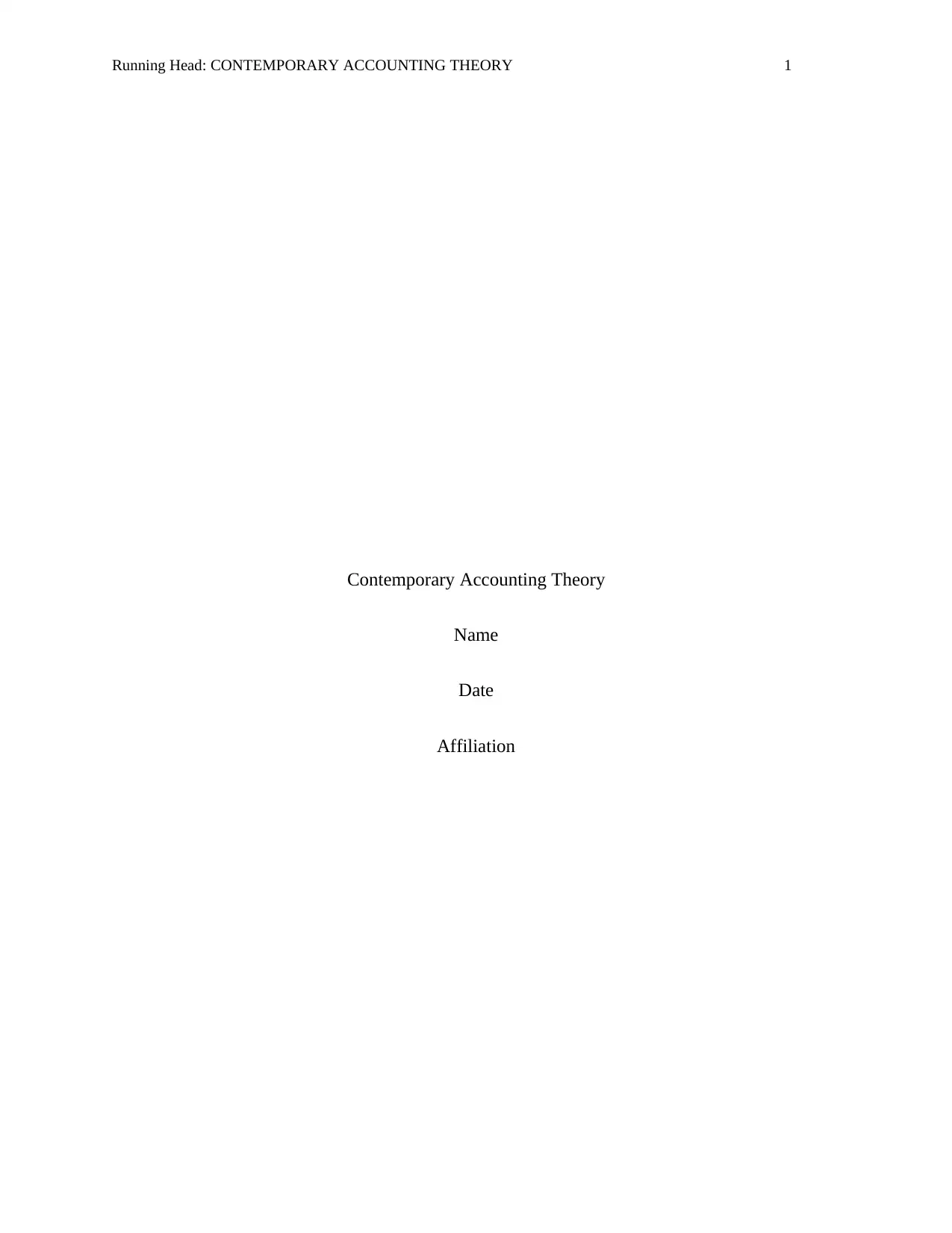
Running Head: CONTEMPORARY ACCOUNTING THEORY 1
Contemporary Accounting Theory
Name
Date
Affiliation
Contemporary Accounting Theory
Name
Date
Affiliation
Secure Best Marks with AI Grader
Need help grading? Try our AI Grader for instant feedback on your assignments.
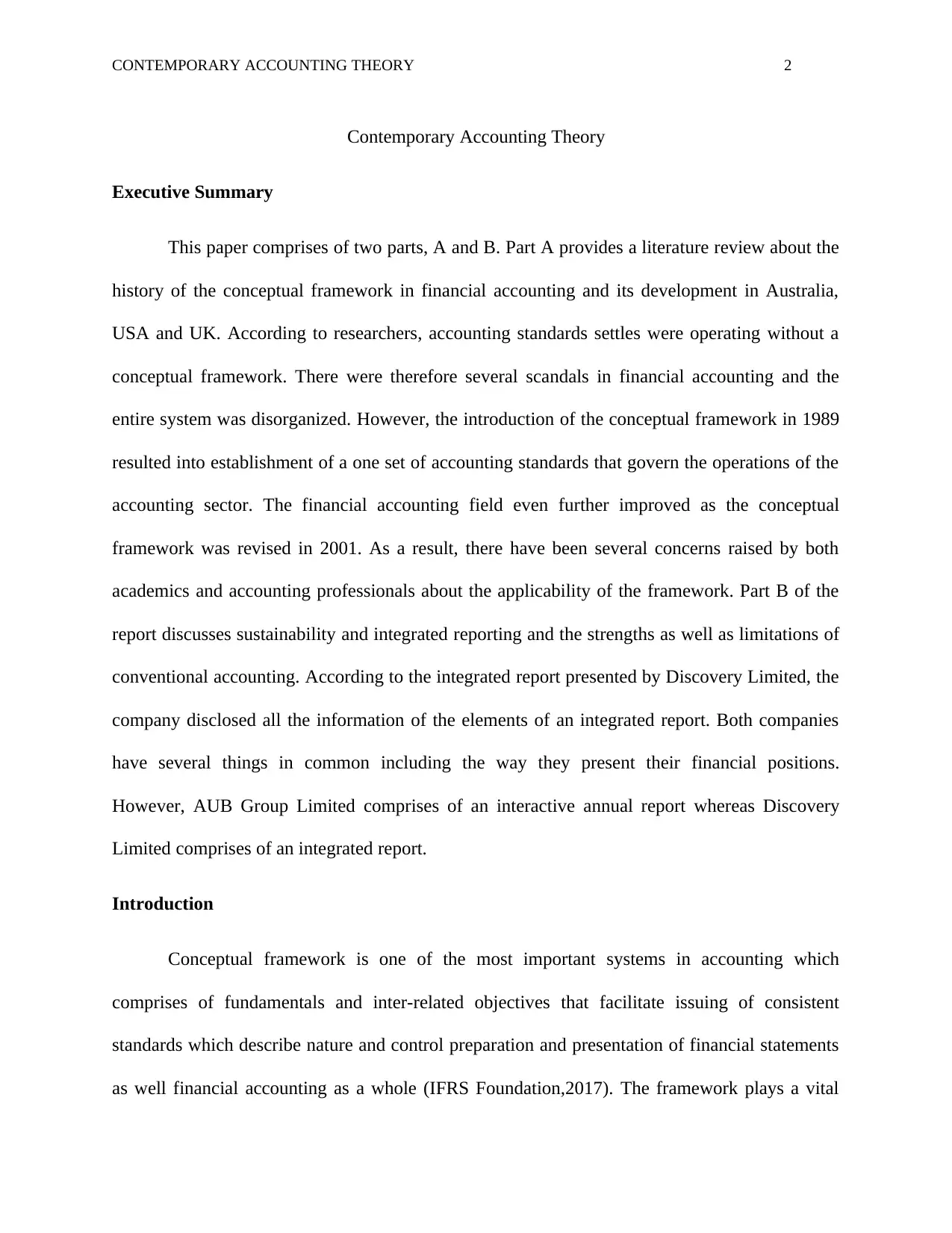
CONTEMPORARY ACCOUNTING THEORY 2
Contemporary Accounting Theory
Executive Summary
This paper comprises of two parts, A and B. Part A provides a literature review about the
history of the conceptual framework in financial accounting and its development in Australia,
USA and UK. According to researchers, accounting standards settles were operating without a
conceptual framework. There were therefore several scandals in financial accounting and the
entire system was disorganized. However, the introduction of the conceptual framework in 1989
resulted into establishment of a one set of accounting standards that govern the operations of the
accounting sector. The financial accounting field even further improved as the conceptual
framework was revised in 2001. As a result, there have been several concerns raised by both
academics and accounting professionals about the applicability of the framework. Part B of the
report discusses sustainability and integrated reporting and the strengths as well as limitations of
conventional accounting. According to the integrated report presented by Discovery Limited, the
company disclosed all the information of the elements of an integrated report. Both companies
have several things in common including the way they present their financial positions.
However, AUB Group Limited comprises of an interactive annual report whereas Discovery
Limited comprises of an integrated report.
Introduction
Conceptual framework is one of the most important systems in accounting which
comprises of fundamentals and inter-related objectives that facilitate issuing of consistent
standards which describe nature and control preparation and presentation of financial statements
as well financial accounting as a whole (IFRS Foundation,2017). The framework plays a vital
Contemporary Accounting Theory
Executive Summary
This paper comprises of two parts, A and B. Part A provides a literature review about the
history of the conceptual framework in financial accounting and its development in Australia,
USA and UK. According to researchers, accounting standards settles were operating without a
conceptual framework. There were therefore several scandals in financial accounting and the
entire system was disorganized. However, the introduction of the conceptual framework in 1989
resulted into establishment of a one set of accounting standards that govern the operations of the
accounting sector. The financial accounting field even further improved as the conceptual
framework was revised in 2001. As a result, there have been several concerns raised by both
academics and accounting professionals about the applicability of the framework. Part B of the
report discusses sustainability and integrated reporting and the strengths as well as limitations of
conventional accounting. According to the integrated report presented by Discovery Limited, the
company disclosed all the information of the elements of an integrated report. Both companies
have several things in common including the way they present their financial positions.
However, AUB Group Limited comprises of an interactive annual report whereas Discovery
Limited comprises of an integrated report.
Introduction
Conceptual framework is one of the most important systems in accounting which
comprises of fundamentals and inter-related objectives that facilitate issuing of consistent
standards which describe nature and control preparation and presentation of financial statements
as well financial accounting as a whole (IFRS Foundation,2017). The framework plays a vital
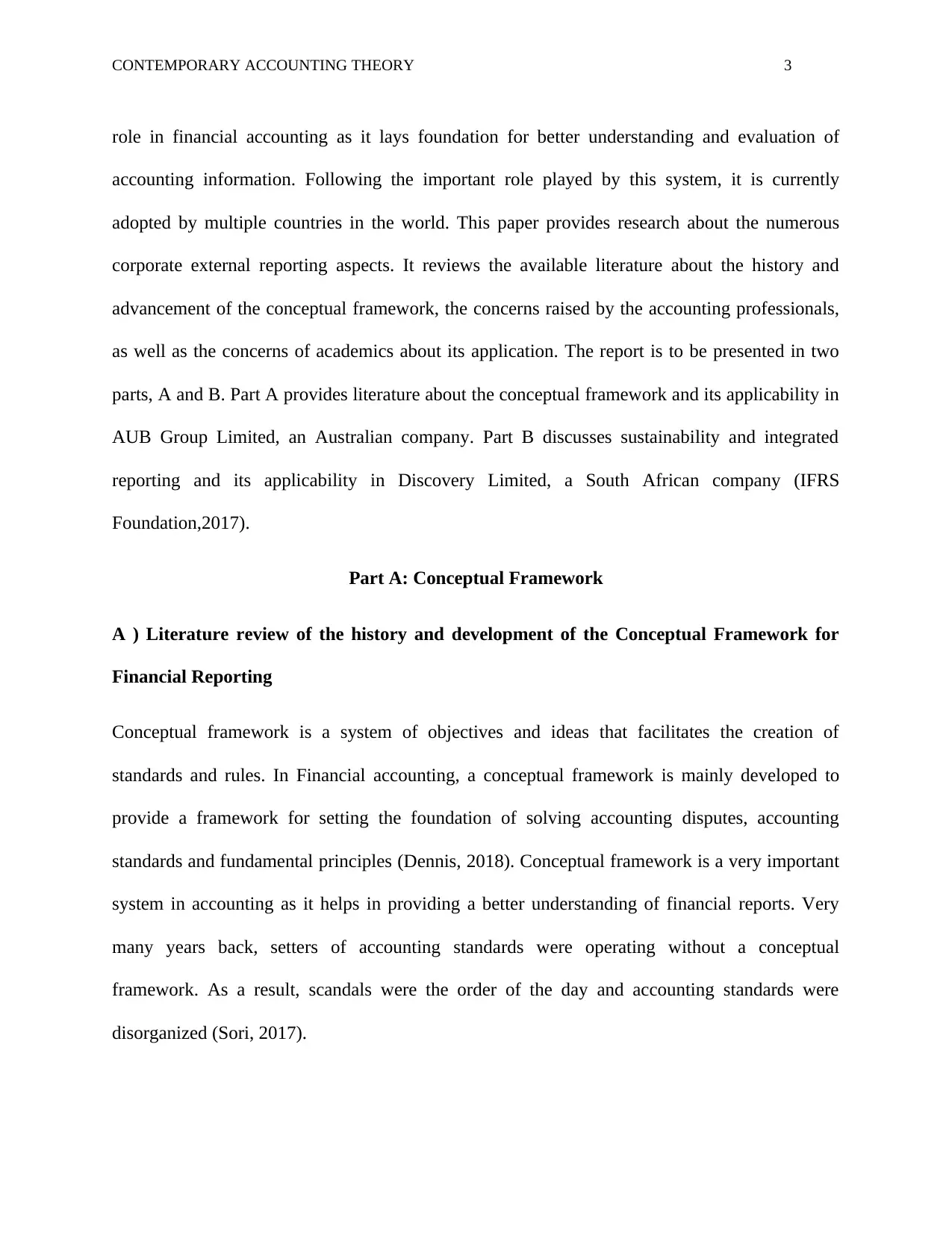
CONTEMPORARY ACCOUNTING THEORY 3
role in financial accounting as it lays foundation for better understanding and evaluation of
accounting information. Following the important role played by this system, it is currently
adopted by multiple countries in the world. This paper provides research about the numerous
corporate external reporting aspects. It reviews the available literature about the history and
advancement of the conceptual framework, the concerns raised by the accounting professionals,
as well as the concerns of academics about its application. The report is to be presented in two
parts, A and B. Part A provides literature about the conceptual framework and its applicability in
AUB Group Limited, an Australian company. Part B discusses sustainability and integrated
reporting and its applicability in Discovery Limited, a South African company (IFRS
Foundation,2017).
Part A: Conceptual Framework
A ) Literature review of the history and development of the Conceptual Framework for
Financial Reporting
Conceptual framework is a system of objectives and ideas that facilitates the creation of
standards and rules. In Financial accounting, a conceptual framework is mainly developed to
provide a framework for setting the foundation of solving accounting disputes, accounting
standards and fundamental principles (Dennis, 2018). Conceptual framework is a very important
system in accounting as it helps in providing a better understanding of financial reports. Very
many years back, setters of accounting standards were operating without a conceptual
framework. As a result, scandals were the order of the day and accounting standards were
disorganized (Sori, 2017).
role in financial accounting as it lays foundation for better understanding and evaluation of
accounting information. Following the important role played by this system, it is currently
adopted by multiple countries in the world. This paper provides research about the numerous
corporate external reporting aspects. It reviews the available literature about the history and
advancement of the conceptual framework, the concerns raised by the accounting professionals,
as well as the concerns of academics about its application. The report is to be presented in two
parts, A and B. Part A provides literature about the conceptual framework and its applicability in
AUB Group Limited, an Australian company. Part B discusses sustainability and integrated
reporting and its applicability in Discovery Limited, a South African company (IFRS
Foundation,2017).
Part A: Conceptual Framework
A ) Literature review of the history and development of the Conceptual Framework for
Financial Reporting
Conceptual framework is a system of objectives and ideas that facilitates the creation of
standards and rules. In Financial accounting, a conceptual framework is mainly developed to
provide a framework for setting the foundation of solving accounting disputes, accounting
standards and fundamental principles (Dennis, 2018). Conceptual framework is a very important
system in accounting as it helps in providing a better understanding of financial reports. Very
many years back, setters of accounting standards were operating without a conceptual
framework. As a result, scandals were the order of the day and accounting standards were
disorganized (Sori, 2017).
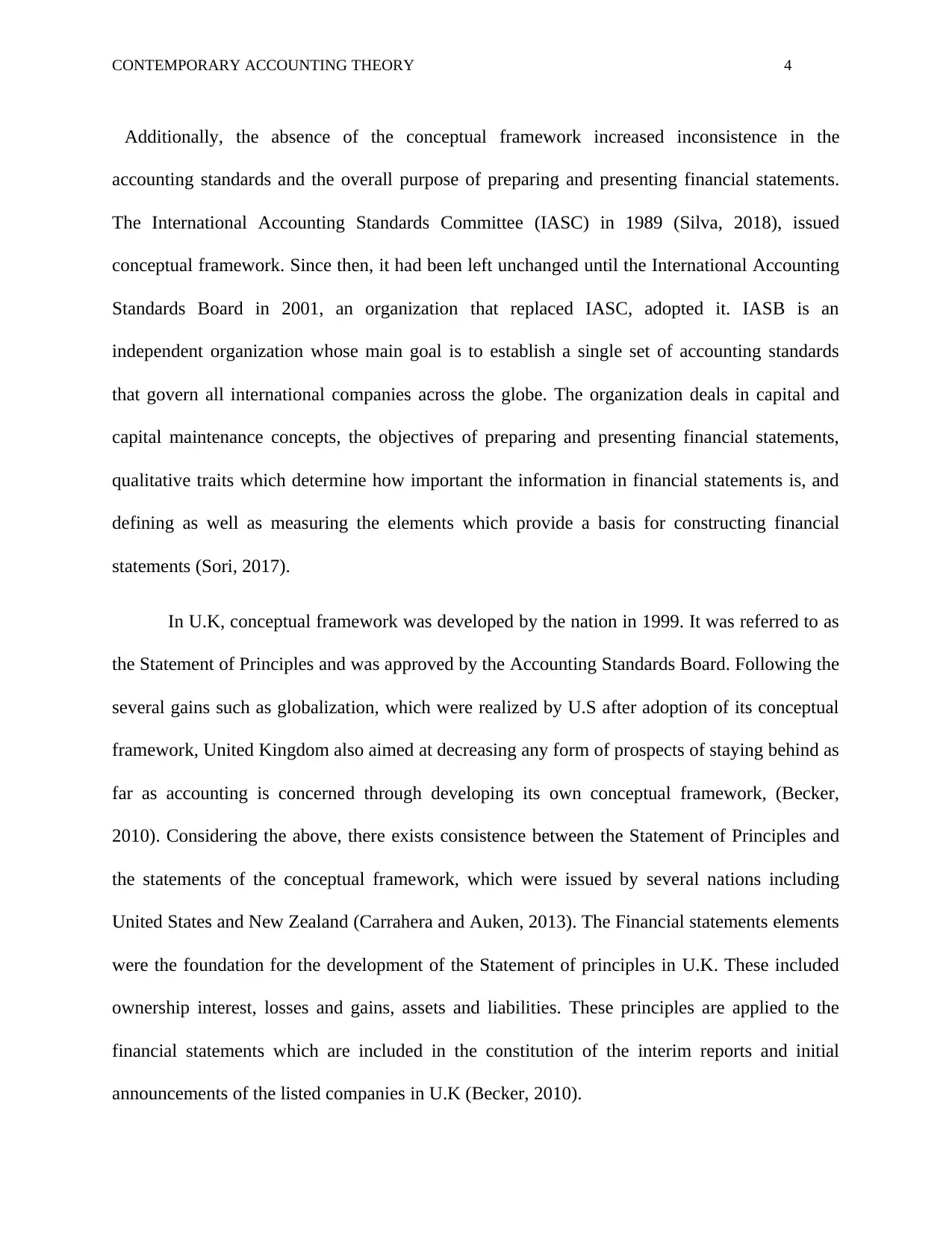
CONTEMPORARY ACCOUNTING THEORY 4
Additionally, the absence of the conceptual framework increased inconsistence in the
accounting standards and the overall purpose of preparing and presenting financial statements.
The International Accounting Standards Committee (IASC) in 1989 (Silva, 2018), issued
conceptual framework. Since then, it had been left unchanged until the International Accounting
Standards Board in 2001, an organization that replaced IASC, adopted it. IASB is an
independent organization whose main goal is to establish a single set of accounting standards
that govern all international companies across the globe. The organization deals in capital and
capital maintenance concepts, the objectives of preparing and presenting financial statements,
qualitative traits which determine how important the information in financial statements is, and
defining as well as measuring the elements which provide a basis for constructing financial
statements (Sori, 2017).
In U.K, conceptual framework was developed by the nation in 1999. It was referred to as
the Statement of Principles and was approved by the Accounting Standards Board. Following the
several gains such as globalization, which were realized by U.S after adoption of its conceptual
framework, United Kingdom also aimed at decreasing any form of prospects of staying behind as
far as accounting is concerned through developing its own conceptual framework, (Becker,
2010). Considering the above, there exists consistence between the Statement of Principles and
the statements of the conceptual framework, which were issued by several nations including
United States and New Zealand (Carrahera and Auken, 2013). The Financial statements elements
were the foundation for the development of the Statement of principles in U.K. These included
ownership interest, losses and gains, assets and liabilities. These principles are applied to the
financial statements which are included in the constitution of the interim reports and initial
announcements of the listed companies in U.K (Becker, 2010).
Additionally, the absence of the conceptual framework increased inconsistence in the
accounting standards and the overall purpose of preparing and presenting financial statements.
The International Accounting Standards Committee (IASC) in 1989 (Silva, 2018), issued
conceptual framework. Since then, it had been left unchanged until the International Accounting
Standards Board in 2001, an organization that replaced IASC, adopted it. IASB is an
independent organization whose main goal is to establish a single set of accounting standards
that govern all international companies across the globe. The organization deals in capital and
capital maintenance concepts, the objectives of preparing and presenting financial statements,
qualitative traits which determine how important the information in financial statements is, and
defining as well as measuring the elements which provide a basis for constructing financial
statements (Sori, 2017).
In U.K, conceptual framework was developed by the nation in 1999. It was referred to as
the Statement of Principles and was approved by the Accounting Standards Board. Following the
several gains such as globalization, which were realized by U.S after adoption of its conceptual
framework, United Kingdom also aimed at decreasing any form of prospects of staying behind as
far as accounting is concerned through developing its own conceptual framework, (Becker,
2010). Considering the above, there exists consistence between the Statement of Principles and
the statements of the conceptual framework, which were issued by several nations including
United States and New Zealand (Carrahera and Auken, 2013). The Financial statements elements
were the foundation for the development of the Statement of principles in U.K. These included
ownership interest, losses and gains, assets and liabilities. These principles are applied to the
financial statements which are included in the constitution of the interim reports and initial
announcements of the listed companies in U.K (Becker, 2010).
Secure Best Marks with AI Grader
Need help grading? Try our AI Grader for instant feedback on your assignments.
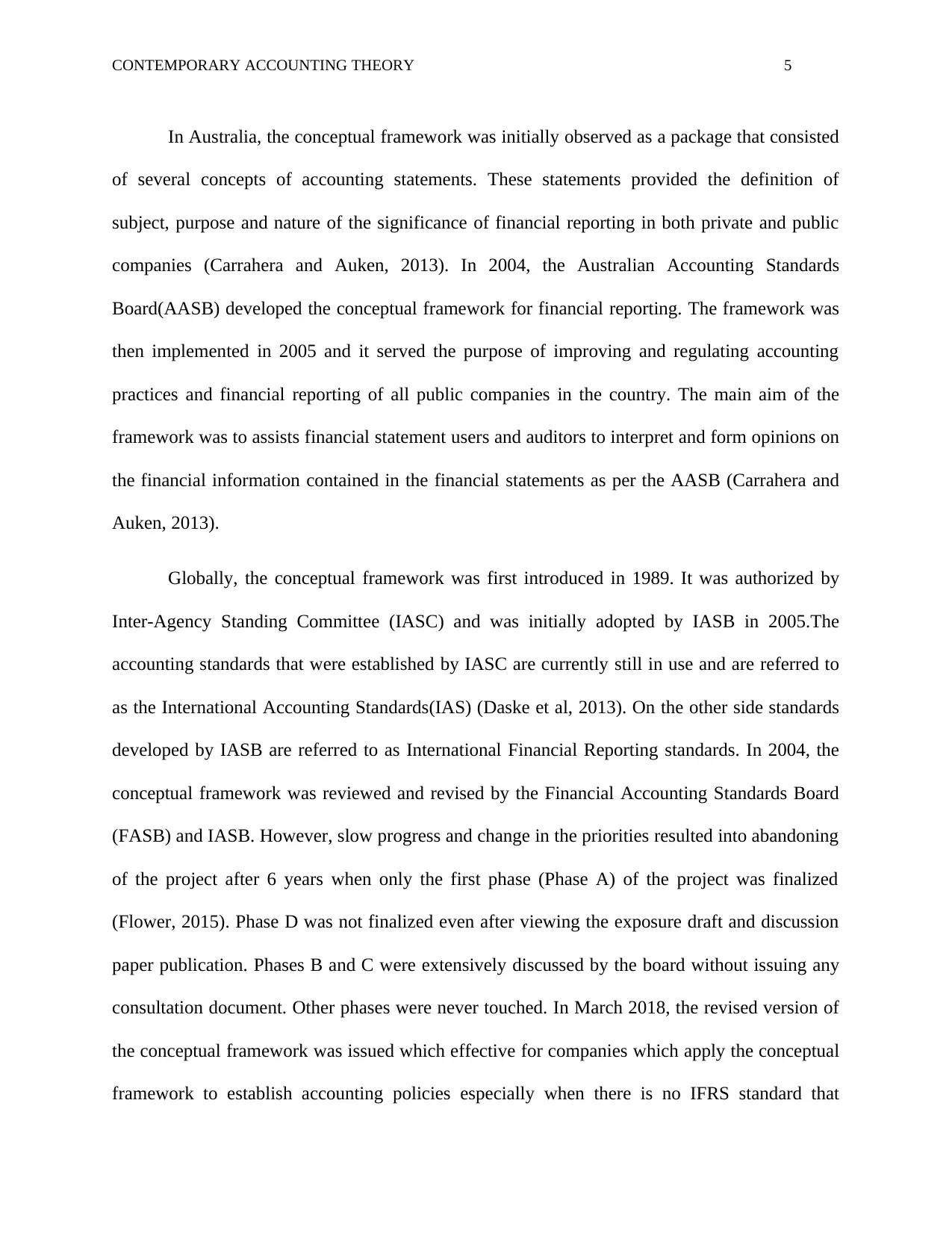
CONTEMPORARY ACCOUNTING THEORY 5
In Australia, the conceptual framework was initially observed as a package that consisted
of several concepts of accounting statements. These statements provided the definition of
subject, purpose and nature of the significance of financial reporting in both private and public
companies (Carrahera and Auken, 2013). In 2004, the Australian Accounting Standards
Board(AASB) developed the conceptual framework for financial reporting. The framework was
then implemented in 2005 and it served the purpose of improving and regulating accounting
practices and financial reporting of all public companies in the country. The main aim of the
framework was to assists financial statement users and auditors to interpret and form opinions on
the financial information contained in the financial statements as per the AASB (Carrahera and
Auken, 2013).
Globally, the conceptual framework was first introduced in 1989. It was authorized by
Inter-Agency Standing Committee (IASC) and was initially adopted by IASB in 2005.The
accounting standards that were established by IASC are currently still in use and are referred to
as the International Accounting Standards(IAS) (Daske et al, 2013). On the other side standards
developed by IASB are referred to as International Financial Reporting standards. In 2004, the
conceptual framework was reviewed and revised by the Financial Accounting Standards Board
(FASB) and IASB. However, slow progress and change in the priorities resulted into abandoning
of the project after 6 years when only the first phase (Phase A) of the project was finalized
(Flower, 2015). Phase D was not finalized even after viewing the exposure draft and discussion
paper publication. Phases B and C were extensively discussed by the board without issuing any
consultation document. Other phases were never touched. In March 2018, the revised version of
the conceptual framework was issued which effective for companies which apply the conceptual
framework to establish accounting policies especially when there is no IFRS standard that
In Australia, the conceptual framework was initially observed as a package that consisted
of several concepts of accounting statements. These statements provided the definition of
subject, purpose and nature of the significance of financial reporting in both private and public
companies (Carrahera and Auken, 2013). In 2004, the Australian Accounting Standards
Board(AASB) developed the conceptual framework for financial reporting. The framework was
then implemented in 2005 and it served the purpose of improving and regulating accounting
practices and financial reporting of all public companies in the country. The main aim of the
framework was to assists financial statement users and auditors to interpret and form opinions on
the financial information contained in the financial statements as per the AASB (Carrahera and
Auken, 2013).
Globally, the conceptual framework was first introduced in 1989. It was authorized by
Inter-Agency Standing Committee (IASC) and was initially adopted by IASB in 2005.The
accounting standards that were established by IASC are currently still in use and are referred to
as the International Accounting Standards(IAS) (Daske et al, 2013). On the other side standards
developed by IASB are referred to as International Financial Reporting standards. In 2004, the
conceptual framework was reviewed and revised by the Financial Accounting Standards Board
(FASB) and IASB. However, slow progress and change in the priorities resulted into abandoning
of the project after 6 years when only the first phase (Phase A) of the project was finalized
(Flower, 2015). Phase D was not finalized even after viewing the exposure draft and discussion
paper publication. Phases B and C were extensively discussed by the board without issuing any
consultation document. Other phases were never touched. In March 2018, the revised version of
the conceptual framework was issued which effective for companies which apply the conceptual
framework to establish accounting policies especially when there is no IFRS standard that
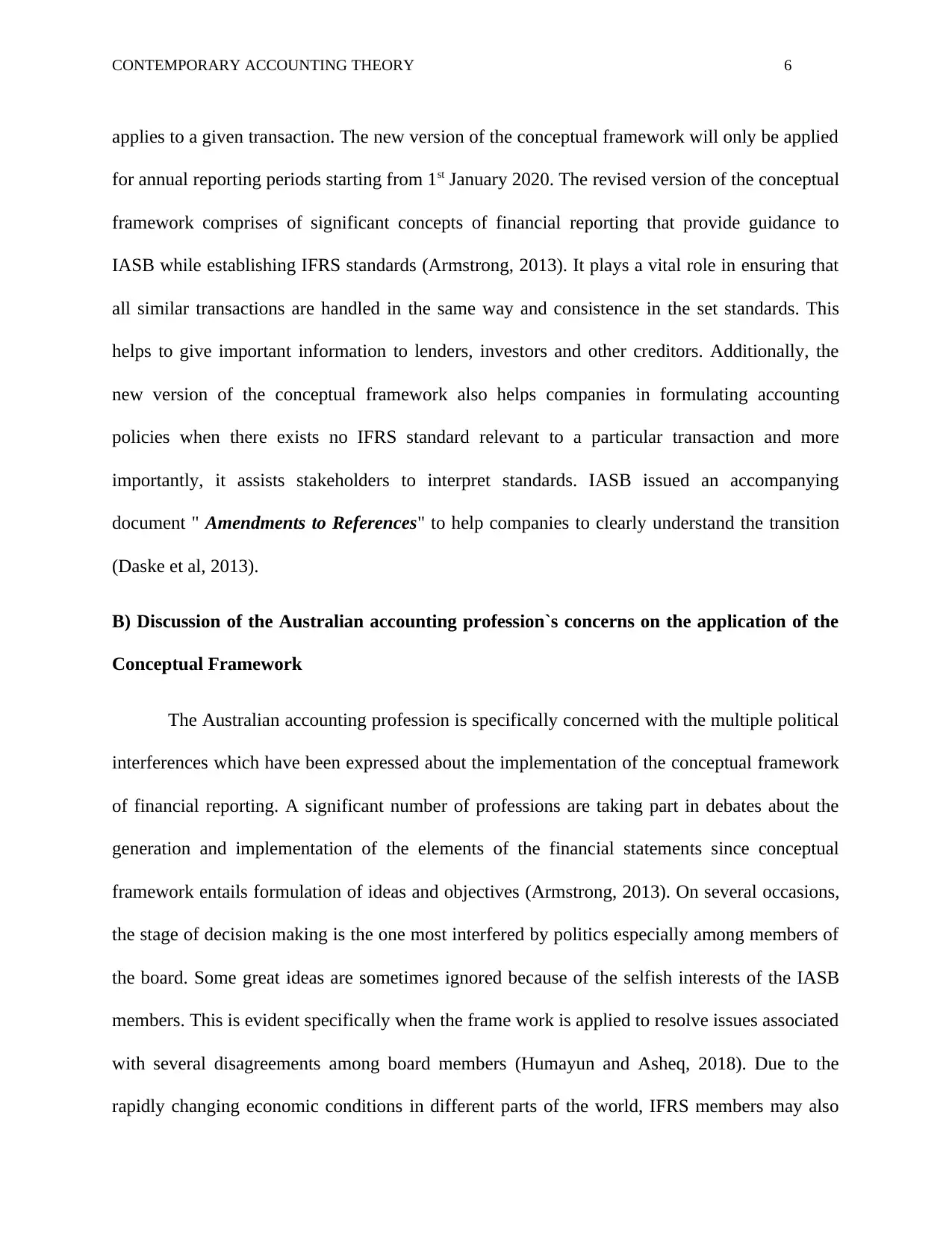
CONTEMPORARY ACCOUNTING THEORY 6
applies to a given transaction. The new version of the conceptual framework will only be applied
for annual reporting periods starting from 1st January 2020. The revised version of the conceptual
framework comprises of significant concepts of financial reporting that provide guidance to
IASB while establishing IFRS standards (Armstrong, 2013). It plays a vital role in ensuring that
all similar transactions are handled in the same way and consistence in the set standards. This
helps to give important information to lenders, investors and other creditors. Additionally, the
new version of the conceptual framework also helps companies in formulating accounting
policies when there exists no IFRS standard relevant to a particular transaction and more
importantly, it assists stakeholders to interpret standards. IASB issued an accompanying
document " Amendments to References" to help companies to clearly understand the transition
(Daske et al, 2013).
B) Discussion of the Australian accounting profession`s concerns on the application of the
Conceptual Framework
The Australian accounting profession is specifically concerned with the multiple political
interferences which have been expressed about the implementation of the conceptual framework
of financial reporting. A significant number of professions are taking part in debates about the
generation and implementation of the elements of the financial statements since conceptual
framework entails formulation of ideas and objectives (Armstrong, 2013). On several occasions,
the stage of decision making is the one most interfered by politics especially among members of
the board. Some great ideas are sometimes ignored because of the selfish interests of the IASB
members. This is evident specifically when the frame work is applied to resolve issues associated
with several disagreements among board members (Humayun and Asheq, 2018). Due to the
rapidly changing economic conditions in different parts of the world, IFRS members may also
applies to a given transaction. The new version of the conceptual framework will only be applied
for annual reporting periods starting from 1st January 2020. The revised version of the conceptual
framework comprises of significant concepts of financial reporting that provide guidance to
IASB while establishing IFRS standards (Armstrong, 2013). It plays a vital role in ensuring that
all similar transactions are handled in the same way and consistence in the set standards. This
helps to give important information to lenders, investors and other creditors. Additionally, the
new version of the conceptual framework also helps companies in formulating accounting
policies when there exists no IFRS standard relevant to a particular transaction and more
importantly, it assists stakeholders to interpret standards. IASB issued an accompanying
document " Amendments to References" to help companies to clearly understand the transition
(Daske et al, 2013).
B) Discussion of the Australian accounting profession`s concerns on the application of the
Conceptual Framework
The Australian accounting profession is specifically concerned with the multiple political
interferences which have been expressed about the implementation of the conceptual framework
of financial reporting. A significant number of professions are taking part in debates about the
generation and implementation of the elements of the financial statements since conceptual
framework entails formulation of ideas and objectives (Armstrong, 2013). On several occasions,
the stage of decision making is the one most interfered by politics especially among members of
the board. Some great ideas are sometimes ignored because of the selfish interests of the IASB
members. This is evident specifically when the frame work is applied to resolve issues associated
with several disagreements among board members (Humayun and Asheq, 2018). Due to the
rapidly changing economic conditions in different parts of the world, IFRS members may also
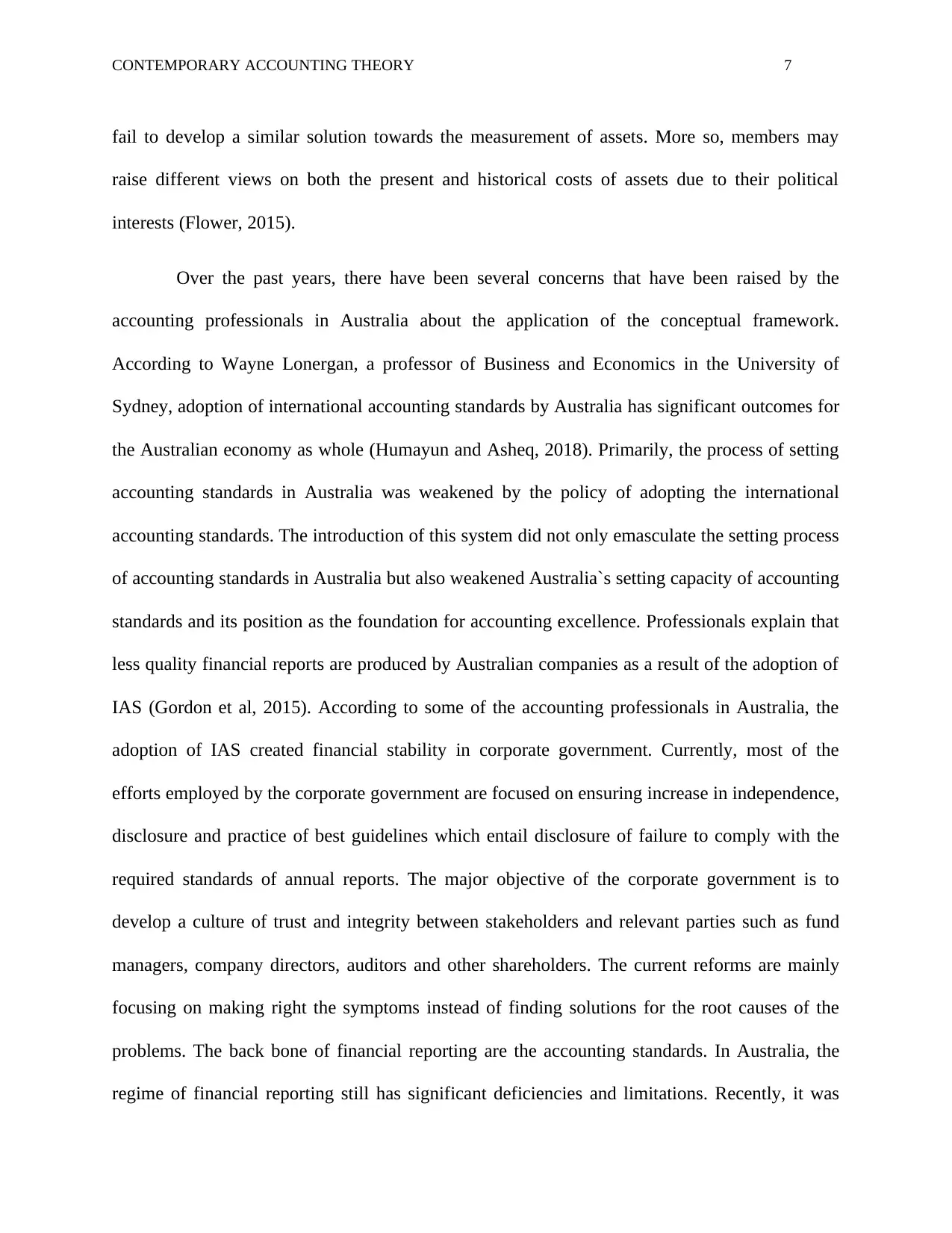
CONTEMPORARY ACCOUNTING THEORY 7
fail to develop a similar solution towards the measurement of assets. More so, members may
raise different views on both the present and historical costs of assets due to their political
interests (Flower, 2015).
Over the past years, there have been several concerns that have been raised by the
accounting professionals in Australia about the application of the conceptual framework.
According to Wayne Lonergan, a professor of Business and Economics in the University of
Sydney, adoption of international accounting standards by Australia has significant outcomes for
the Australian economy as whole (Humayun and Asheq, 2018). Primarily, the process of setting
accounting standards in Australia was weakened by the policy of adopting the international
accounting standards. The introduction of this system did not only emasculate the setting process
of accounting standards in Australia but also weakened Australia`s setting capacity of accounting
standards and its position as the foundation for accounting excellence. Professionals explain that
less quality financial reports are produced by Australian companies as a result of the adoption of
IAS (Gordon et al, 2015). According to some of the accounting professionals in Australia, the
adoption of IAS created financial stability in corporate government. Currently, most of the
efforts employed by the corporate government are focused on ensuring increase in independence,
disclosure and practice of best guidelines which entail disclosure of failure to comply with the
required standards of annual reports. The major objective of the corporate government is to
develop a culture of trust and integrity between stakeholders and relevant parties such as fund
managers, company directors, auditors and other shareholders. The current reforms are mainly
focusing on making right the symptoms instead of finding solutions for the root causes of the
problems. The back bone of financial reporting are the accounting standards. In Australia, the
regime of financial reporting still has significant deficiencies and limitations. Recently, it was
fail to develop a similar solution towards the measurement of assets. More so, members may
raise different views on both the present and historical costs of assets due to their political
interests (Flower, 2015).
Over the past years, there have been several concerns that have been raised by the
accounting professionals in Australia about the application of the conceptual framework.
According to Wayne Lonergan, a professor of Business and Economics in the University of
Sydney, adoption of international accounting standards by Australia has significant outcomes for
the Australian economy as whole (Humayun and Asheq, 2018). Primarily, the process of setting
accounting standards in Australia was weakened by the policy of adopting the international
accounting standards. The introduction of this system did not only emasculate the setting process
of accounting standards in Australia but also weakened Australia`s setting capacity of accounting
standards and its position as the foundation for accounting excellence. Professionals explain that
less quality financial reports are produced by Australian companies as a result of the adoption of
IAS (Gordon et al, 2015). According to some of the accounting professionals in Australia, the
adoption of IAS created financial stability in corporate government. Currently, most of the
efforts employed by the corporate government are focused on ensuring increase in independence,
disclosure and practice of best guidelines which entail disclosure of failure to comply with the
required standards of annual reports. The major objective of the corporate government is to
develop a culture of trust and integrity between stakeholders and relevant parties such as fund
managers, company directors, auditors and other shareholders. The current reforms are mainly
focusing on making right the symptoms instead of finding solutions for the root causes of the
problems. The back bone of financial reporting are the accounting standards. In Australia, the
regime of financial reporting still has significant deficiencies and limitations. Recently, it was
Paraphrase This Document
Need a fresh take? Get an instant paraphrase of this document with our AI Paraphraser
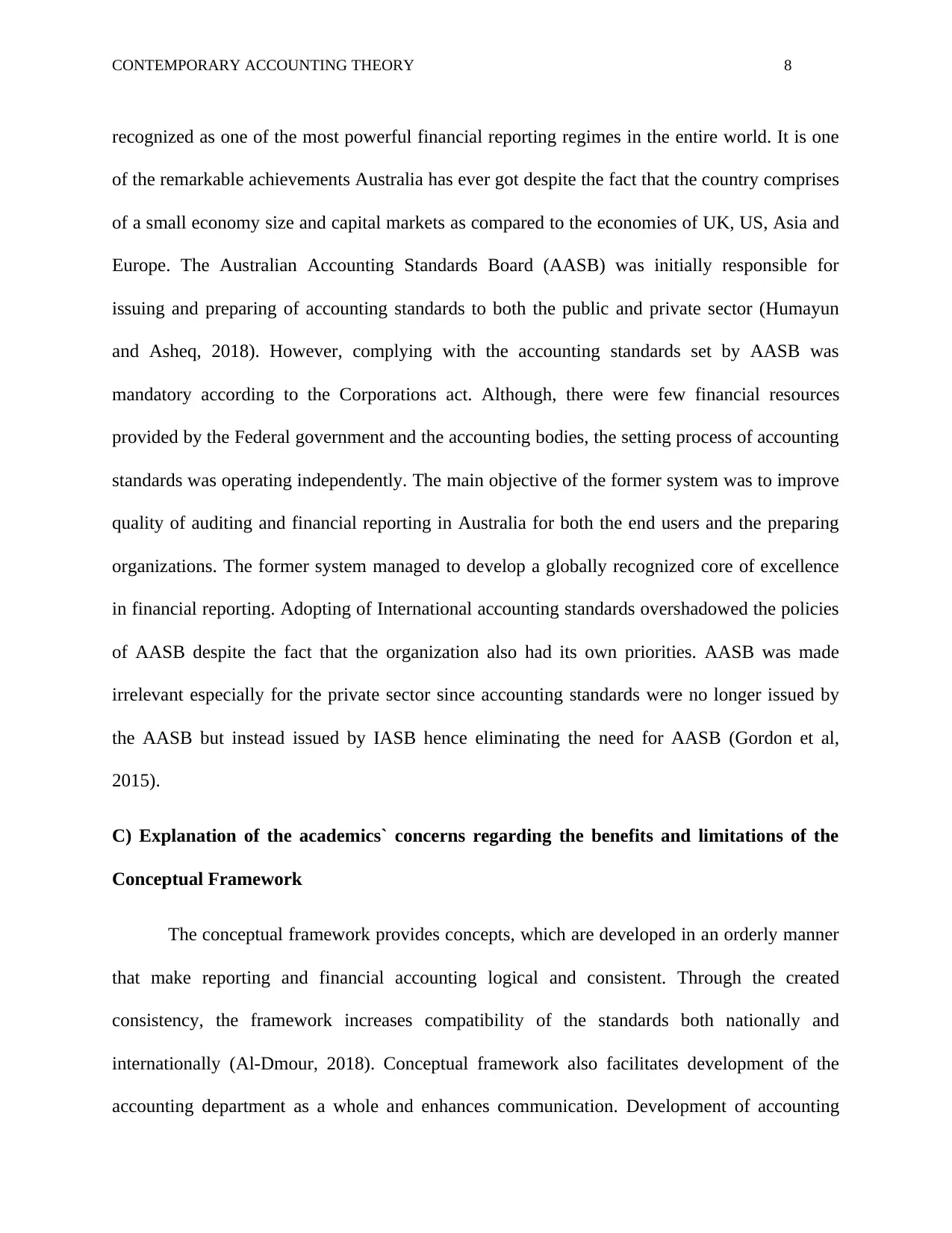
CONTEMPORARY ACCOUNTING THEORY 8
recognized as one of the most powerful financial reporting regimes in the entire world. It is one
of the remarkable achievements Australia has ever got despite the fact that the country comprises
of a small economy size and capital markets as compared to the economies of UK, US, Asia and
Europe. The Australian Accounting Standards Board (AASB) was initially responsible for
issuing and preparing of accounting standards to both the public and private sector (Humayun
and Asheq, 2018). However, complying with the accounting standards set by AASB was
mandatory according to the Corporations act. Although, there were few financial resources
provided by the Federal government and the accounting bodies, the setting process of accounting
standards was operating independently. The main objective of the former system was to improve
quality of auditing and financial reporting in Australia for both the end users and the preparing
organizations. The former system managed to develop a globally recognized core of excellence
in financial reporting. Adopting of International accounting standards overshadowed the policies
of AASB despite the fact that the organization also had its own priorities. AASB was made
irrelevant especially for the private sector since accounting standards were no longer issued by
the AASB but instead issued by IASB hence eliminating the need for AASB (Gordon et al,
2015).
C) Explanation of the academics` concerns regarding the benefits and limitations of the
Conceptual Framework
The conceptual framework provides concepts, which are developed in an orderly manner
that make reporting and financial accounting logical and consistent. Through the created
consistency, the framework increases compatibility of the standards both nationally and
internationally (Al-Dmour, 2018). Conceptual framework also facilitates development of the
accounting department as a whole and enhances communication. Development of accounting
recognized as one of the most powerful financial reporting regimes in the entire world. It is one
of the remarkable achievements Australia has ever got despite the fact that the country comprises
of a small economy size and capital markets as compared to the economies of UK, US, Asia and
Europe. The Australian Accounting Standards Board (AASB) was initially responsible for
issuing and preparing of accounting standards to both the public and private sector (Humayun
and Asheq, 2018). However, complying with the accounting standards set by AASB was
mandatory according to the Corporations act. Although, there were few financial resources
provided by the Federal government and the accounting bodies, the setting process of accounting
standards was operating independently. The main objective of the former system was to improve
quality of auditing and financial reporting in Australia for both the end users and the preparing
organizations. The former system managed to develop a globally recognized core of excellence
in financial reporting. Adopting of International accounting standards overshadowed the policies
of AASB despite the fact that the organization also had its own priorities. AASB was made
irrelevant especially for the private sector since accounting standards were no longer issued by
the AASB but instead issued by IASB hence eliminating the need for AASB (Gordon et al,
2015).
C) Explanation of the academics` concerns regarding the benefits and limitations of the
Conceptual Framework
The conceptual framework provides concepts, which are developed in an orderly manner
that make reporting and financial accounting logical and consistent. Through the created
consistency, the framework increases compatibility of the standards both nationally and
internationally (Al-Dmour, 2018). Conceptual framework also facilitates development of the
accounting department as a whole and enhances communication. Development of accounting
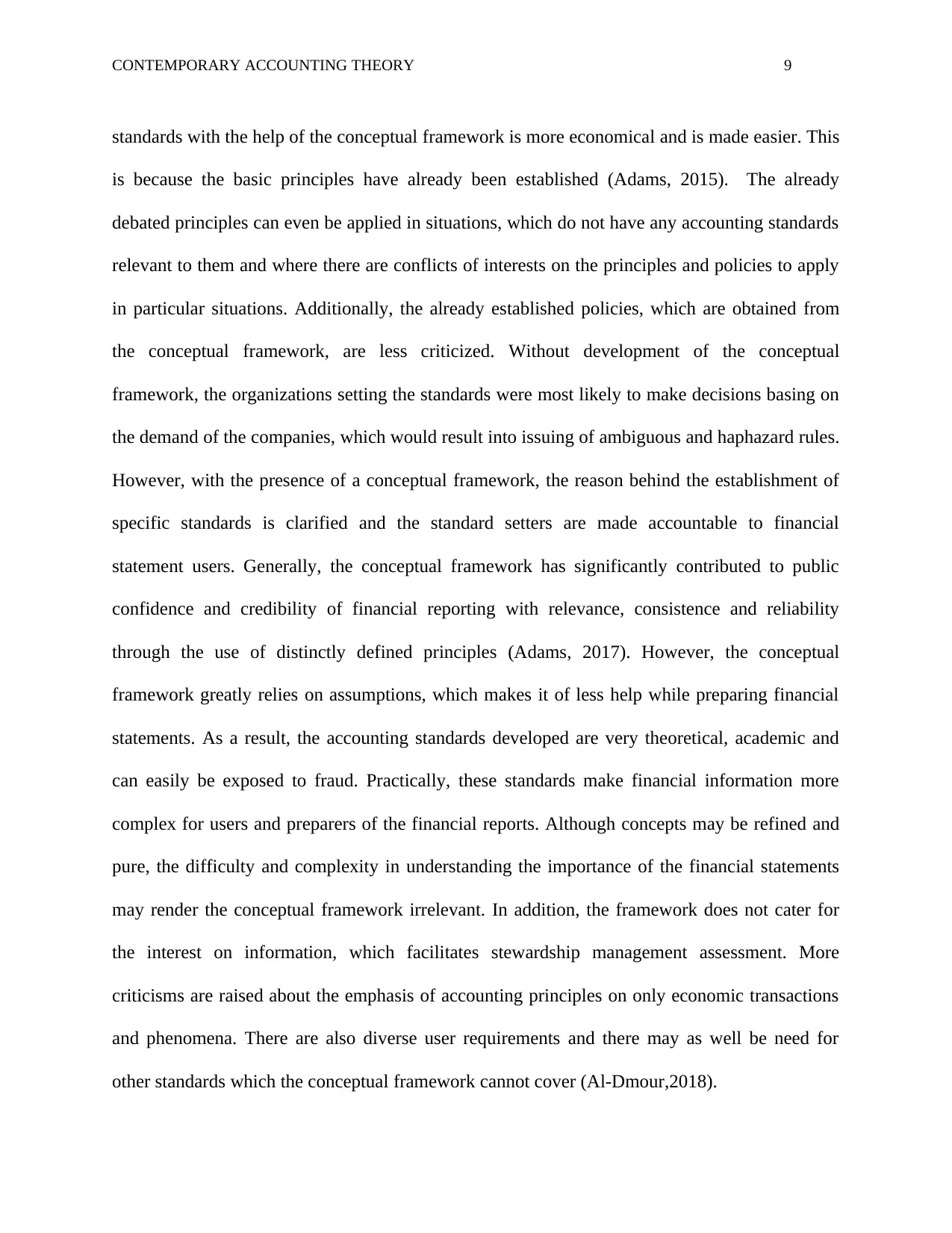
CONTEMPORARY ACCOUNTING THEORY 9
standards with the help of the conceptual framework is more economical and is made easier. This
is because the basic principles have already been established (Adams, 2015). The already
debated principles can even be applied in situations, which do not have any accounting standards
relevant to them and where there are conflicts of interests on the principles and policies to apply
in particular situations. Additionally, the already established policies, which are obtained from
the conceptual framework, are less criticized. Without development of the conceptual
framework, the organizations setting the standards were most likely to make decisions basing on
the demand of the companies, which would result into issuing of ambiguous and haphazard rules.
However, with the presence of a conceptual framework, the reason behind the establishment of
specific standards is clarified and the standard setters are made accountable to financial
statement users. Generally, the conceptual framework has significantly contributed to public
confidence and credibility of financial reporting with relevance, consistence and reliability
through the use of distinctly defined principles (Adams, 2017). However, the conceptual
framework greatly relies on assumptions, which makes it of less help while preparing financial
statements. As a result, the accounting standards developed are very theoretical, academic and
can easily be exposed to fraud. Practically, these standards make financial information more
complex for users and preparers of the financial reports. Although concepts may be refined and
pure, the difficulty and complexity in understanding the importance of the financial statements
may render the conceptual framework irrelevant. In addition, the framework does not cater for
the interest on information, which facilitates stewardship management assessment. More
criticisms are raised about the emphasis of accounting principles on only economic transactions
and phenomena. There are also diverse user requirements and there may as well be need for
other standards which the conceptual framework cannot cover (Al-Dmour,2018).
standards with the help of the conceptual framework is more economical and is made easier. This
is because the basic principles have already been established (Adams, 2015). The already
debated principles can even be applied in situations, which do not have any accounting standards
relevant to them and where there are conflicts of interests on the principles and policies to apply
in particular situations. Additionally, the already established policies, which are obtained from
the conceptual framework, are less criticized. Without development of the conceptual
framework, the organizations setting the standards were most likely to make decisions basing on
the demand of the companies, which would result into issuing of ambiguous and haphazard rules.
However, with the presence of a conceptual framework, the reason behind the establishment of
specific standards is clarified and the standard setters are made accountable to financial
statement users. Generally, the conceptual framework has significantly contributed to public
confidence and credibility of financial reporting with relevance, consistence and reliability
through the use of distinctly defined principles (Adams, 2017). However, the conceptual
framework greatly relies on assumptions, which makes it of less help while preparing financial
statements. As a result, the accounting standards developed are very theoretical, academic and
can easily be exposed to fraud. Practically, these standards make financial information more
complex for users and preparers of the financial reports. Although concepts may be refined and
pure, the difficulty and complexity in understanding the importance of the financial statements
may render the conceptual framework irrelevant. In addition, the framework does not cater for
the interest on information, which facilitates stewardship management assessment. More
criticisms are raised about the emphasis of accounting principles on only economic transactions
and phenomena. There are also diverse user requirements and there may as well be need for
other standards which the conceptual framework cannot cover (Al-Dmour,2018).
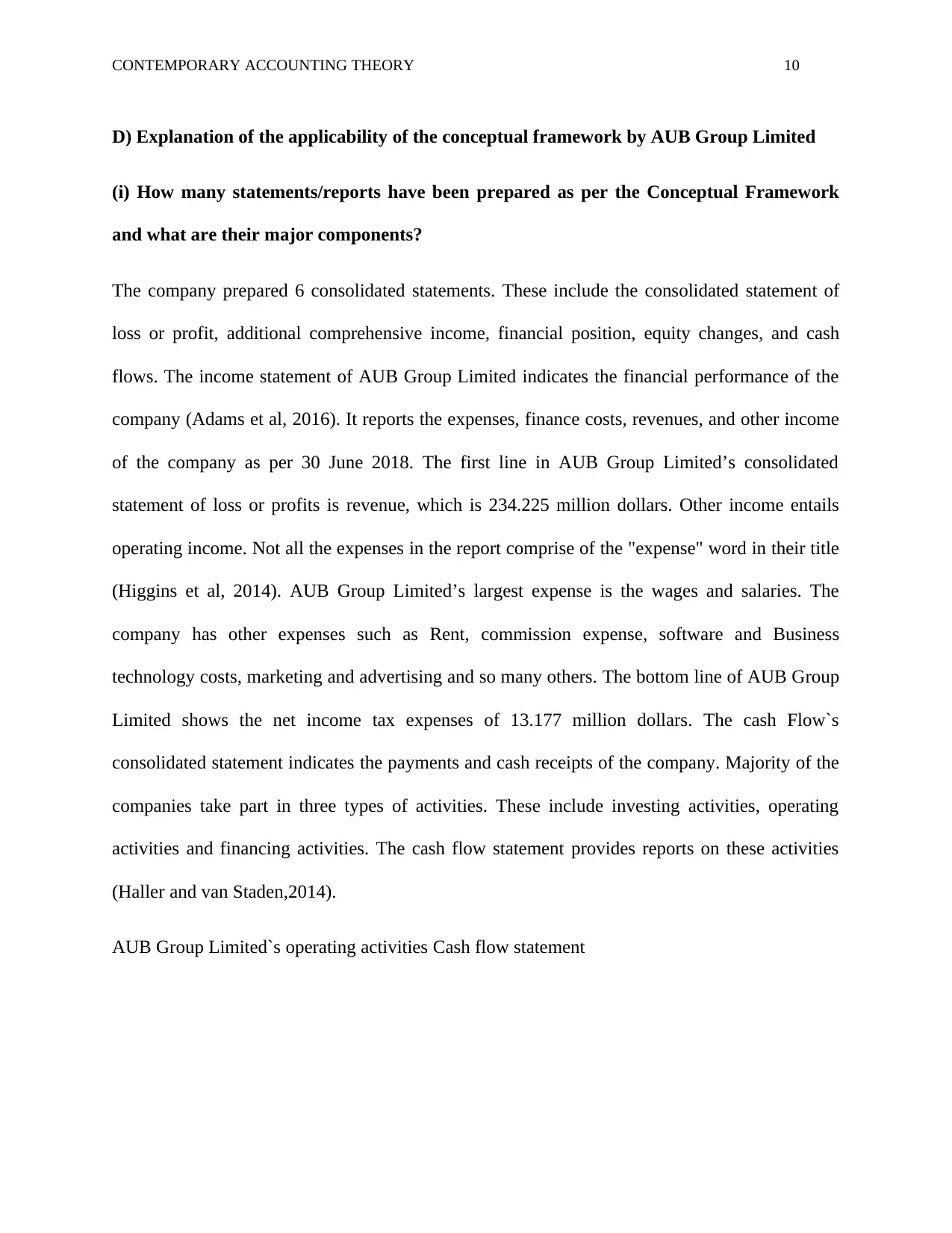
CONTEMPORARY ACCOUNTING THEORY 10
D) Explanation of the applicability of the conceptual framework by AUB Group Limited
(i) How many statements/reports have been prepared as per the Conceptual Framework
and what are their major components?
The company prepared 6 consolidated statements. These include the consolidated statement of
loss or profit, additional comprehensive income, financial position, equity changes, and cash
flows. The income statement of AUB Group Limited indicates the financial performance of the
company (Adams et al, 2016). It reports the expenses, finance costs, revenues, and other income
of the company as per 30 June 2018. The first line in AUB Group Limited’s consolidated
statement of loss or profits is revenue, which is 234.225 million dollars. Other income entails
operating income. Not all the expenses in the report comprise of the "expense" word in their title
(Higgins et al, 2014). AUB Group Limited’s largest expense is the wages and salaries. The
company has other expenses such as Rent, commission expense, software and Business
technology costs, marketing and advertising and so many others. The bottom line of AUB Group
Limited shows the net income tax expenses of 13.177 million dollars. The cash Flow`s
consolidated statement indicates the payments and cash receipts of the company. Majority of the
companies take part in three types of activities. These include investing activities, operating
activities and financing activities. The cash flow statement provides reports on these activities
(Haller and van Staden,2014).
AUB Group Limited`s operating activities Cash flow statement
D) Explanation of the applicability of the conceptual framework by AUB Group Limited
(i) How many statements/reports have been prepared as per the Conceptual Framework
and what are their major components?
The company prepared 6 consolidated statements. These include the consolidated statement of
loss or profit, additional comprehensive income, financial position, equity changes, and cash
flows. The income statement of AUB Group Limited indicates the financial performance of the
company (Adams et al, 2016). It reports the expenses, finance costs, revenues, and other income
of the company as per 30 June 2018. The first line in AUB Group Limited’s consolidated
statement of loss or profits is revenue, which is 234.225 million dollars. Other income entails
operating income. Not all the expenses in the report comprise of the "expense" word in their title
(Higgins et al, 2014). AUB Group Limited’s largest expense is the wages and salaries. The
company has other expenses such as Rent, commission expense, software and Business
technology costs, marketing and advertising and so many others. The bottom line of AUB Group
Limited shows the net income tax expenses of 13.177 million dollars. The cash Flow`s
consolidated statement indicates the payments and cash receipts of the company. Majority of the
companies take part in three types of activities. These include investing activities, operating
activities and financing activities. The cash flow statement provides reports on these activities
(Haller and van Staden,2014).
AUB Group Limited`s operating activities Cash flow statement
Secure Best Marks with AI Grader
Need help grading? Try our AI Grader for instant feedback on your assignments.
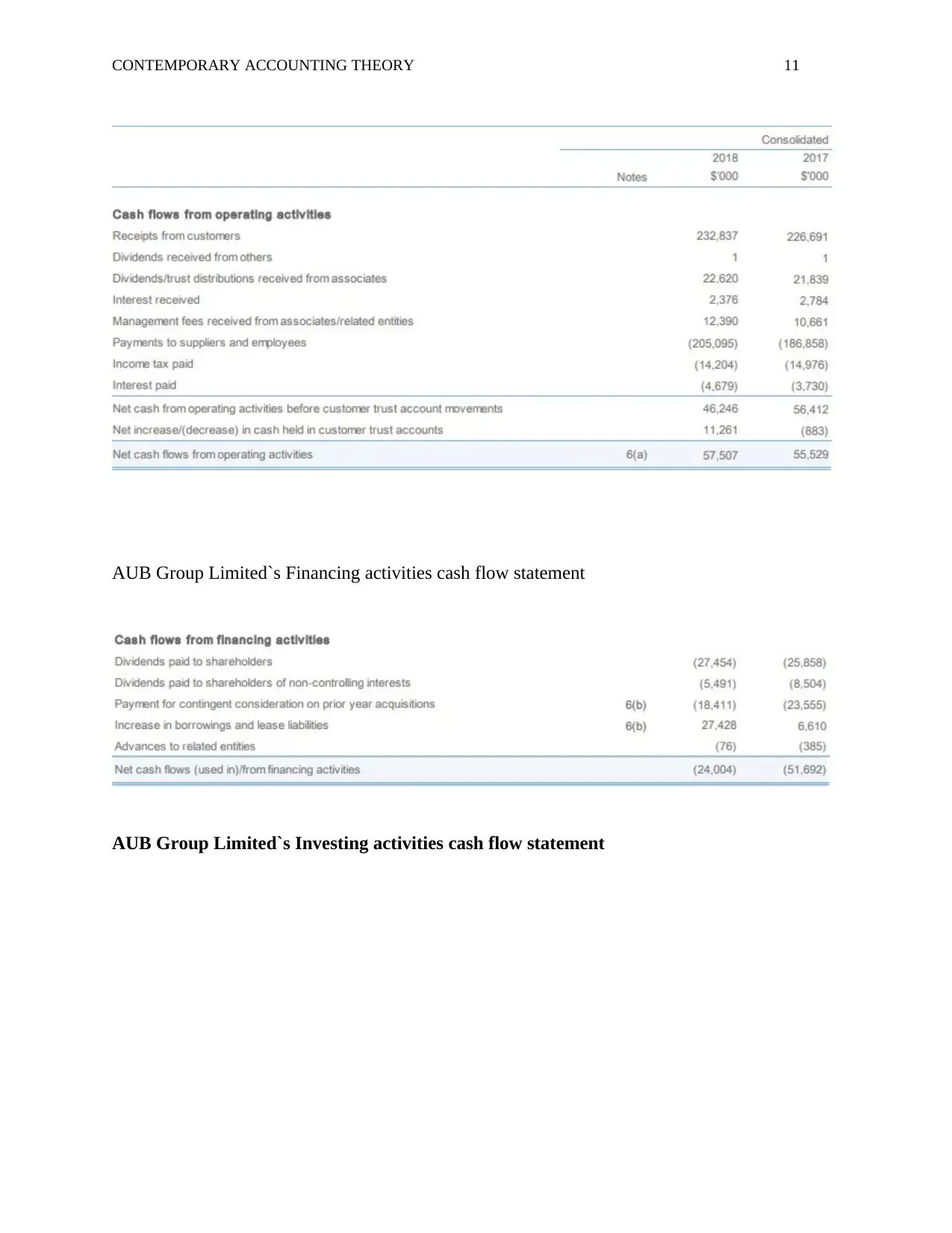
CONTEMPORARY ACCOUNTING THEORY 11
AUB Group Limited`s Financing activities cash flow statement
AUB Group Limited`s Investing activities cash flow statement
AUB Group Limited`s Financing activities cash flow statement
AUB Group Limited`s Investing activities cash flow statement
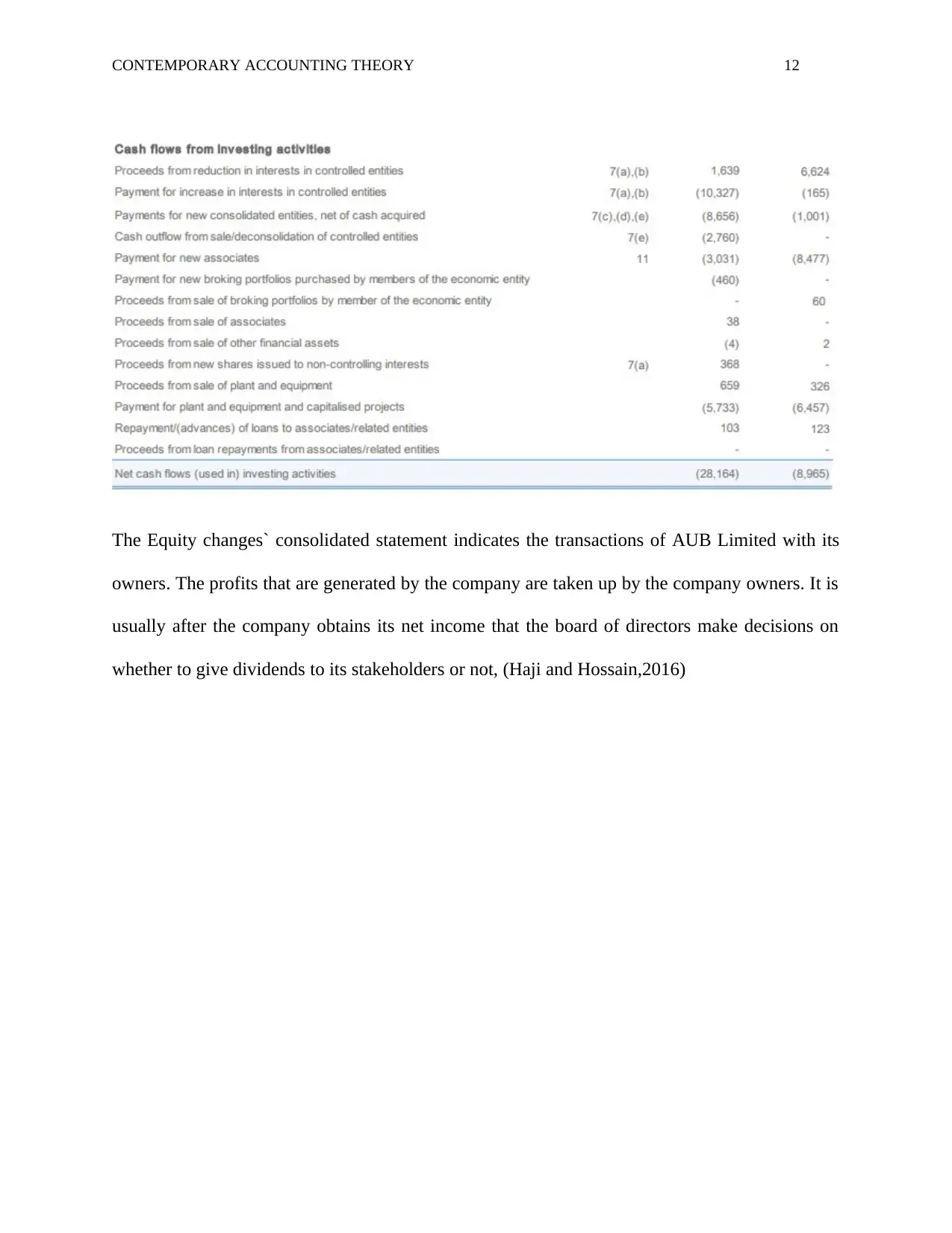
CONTEMPORARY ACCOUNTING THEORY 12
The Equity changes` consolidated statement indicates the transactions of AUB Limited with its
owners. The profits that are generated by the company are taken up by the company owners. It is
usually after the company obtains its net income that the board of directors make decisions on
whether to give dividends to its stakeholders or not, (Haji and Hossain,2016)
The Equity changes` consolidated statement indicates the transactions of AUB Limited with its
owners. The profits that are generated by the company are taken up by the company owners. It is
usually after the company obtains its net income that the board of directors make decisions on
whether to give dividends to its stakeholders or not, (Haji and Hossain,2016)
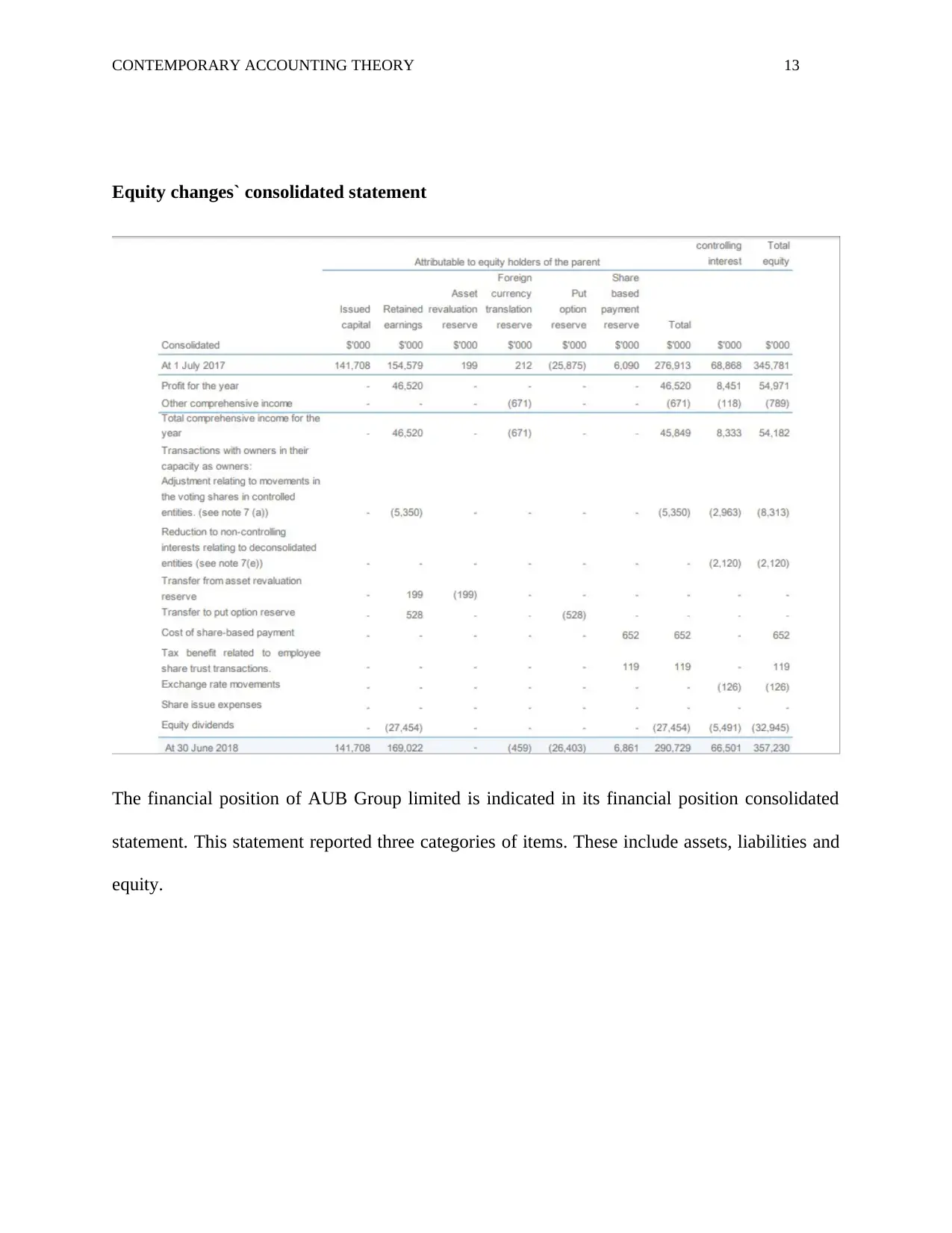
CONTEMPORARY ACCOUNTING THEORY 13
Equity changes` consolidated statement
The financial position of AUB Group limited is indicated in its financial position consolidated
statement. This statement reported three categories of items. These include assets, liabilities and
equity.
Equity changes` consolidated statement
The financial position of AUB Group limited is indicated in its financial position consolidated
statement. This statement reported three categories of items. These include assets, liabilities and
equity.
Paraphrase This Document
Need a fresh take? Get an instant paraphrase of this document with our AI Paraphraser

CONTEMPORARY ACCOUNTING THEORY 14
Assets are categorized into two groups, that is to say current and non-current. Current assets
include cash and its equivalents, trade and other financial assets. Non-current assets include
Assets are categorized into two groups, that is to say current and non-current. Current assets
include cash and its equivalents, trade and other financial assets. Non-current assets include
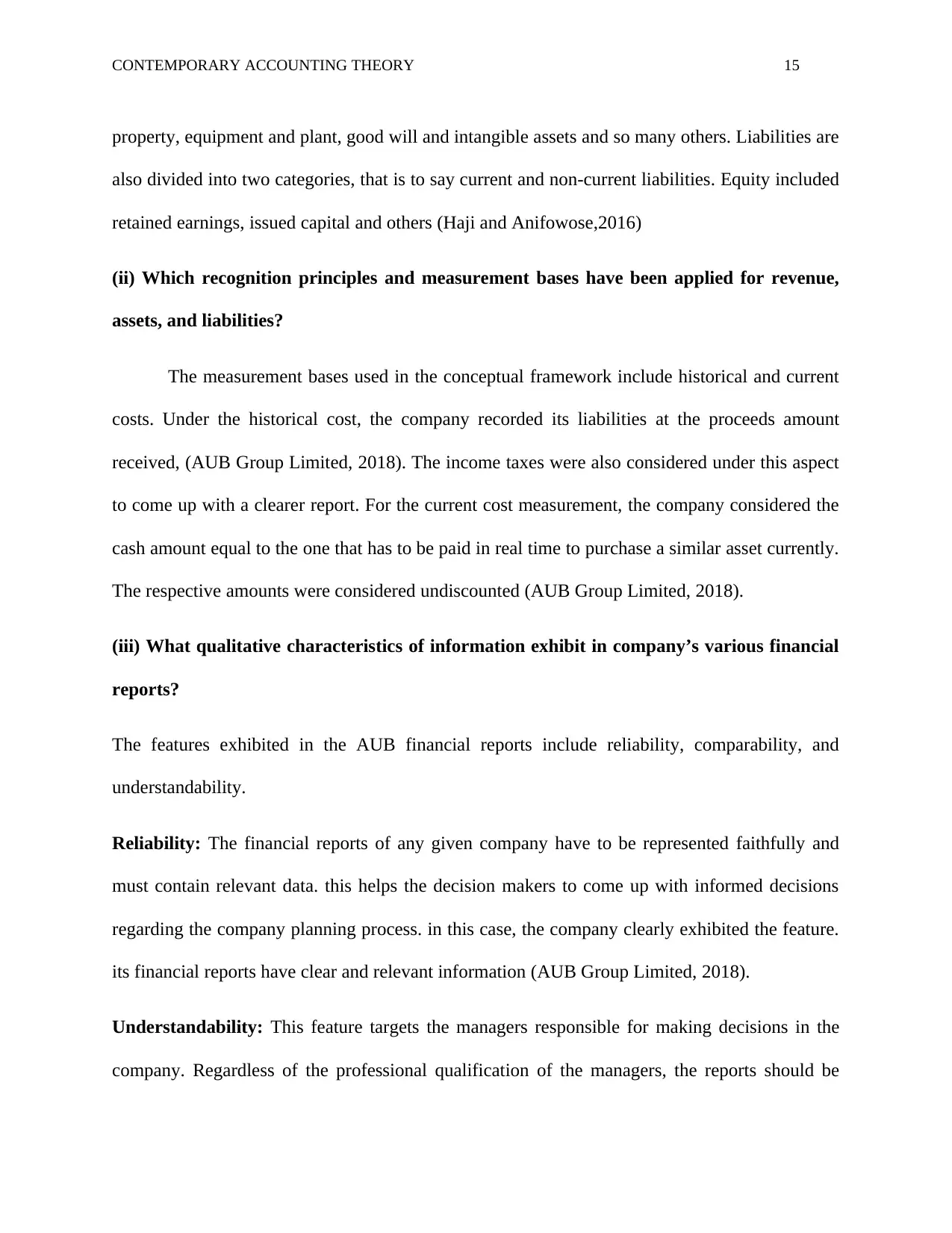
CONTEMPORARY ACCOUNTING THEORY 15
property, equipment and plant, good will and intangible assets and so many others. Liabilities are
also divided into two categories, that is to say current and non-current liabilities. Equity included
retained earnings, issued capital and others (Haji and Anifowose,2016)
(ii) Which recognition principles and measurement bases have been applied for revenue,
assets, and liabilities?
The measurement bases used in the conceptual framework include historical and current
costs. Under the historical cost, the company recorded its liabilities at the proceeds amount
received, (AUB Group Limited, 2018). The income taxes were also considered under this aspect
to come up with a clearer report. For the current cost measurement, the company considered the
cash amount equal to the one that has to be paid in real time to purchase a similar asset currently.
The respective amounts were considered undiscounted (AUB Group Limited, 2018).
(iii) What qualitative characteristics of information exhibit in company’s various financial
reports?
The features exhibited in the AUB financial reports include reliability, comparability, and
understandability.
Reliability: The financial reports of any given company have to be represented faithfully and
must contain relevant data. this helps the decision makers to come up with informed decisions
regarding the company planning process. in this case, the company clearly exhibited the feature.
its financial reports have clear and relevant information (AUB Group Limited, 2018).
Understandability: This feature targets the managers responsible for making decisions in the
company. Regardless of the professional qualification of the managers, the reports should be
property, equipment and plant, good will and intangible assets and so many others. Liabilities are
also divided into two categories, that is to say current and non-current liabilities. Equity included
retained earnings, issued capital and others (Haji and Anifowose,2016)
(ii) Which recognition principles and measurement bases have been applied for revenue,
assets, and liabilities?
The measurement bases used in the conceptual framework include historical and current
costs. Under the historical cost, the company recorded its liabilities at the proceeds amount
received, (AUB Group Limited, 2018). The income taxes were also considered under this aspect
to come up with a clearer report. For the current cost measurement, the company considered the
cash amount equal to the one that has to be paid in real time to purchase a similar asset currently.
The respective amounts were considered undiscounted (AUB Group Limited, 2018).
(iii) What qualitative characteristics of information exhibit in company’s various financial
reports?
The features exhibited in the AUB financial reports include reliability, comparability, and
understandability.
Reliability: The financial reports of any given company have to be represented faithfully and
must contain relevant data. this helps the decision makers to come up with informed decisions
regarding the company planning process. in this case, the company clearly exhibited the feature.
its financial reports have clear and relevant information (AUB Group Limited, 2018).
Understandability: This feature targets the managers responsible for making decisions in the
company. Regardless of the professional qualification of the managers, the reports should be
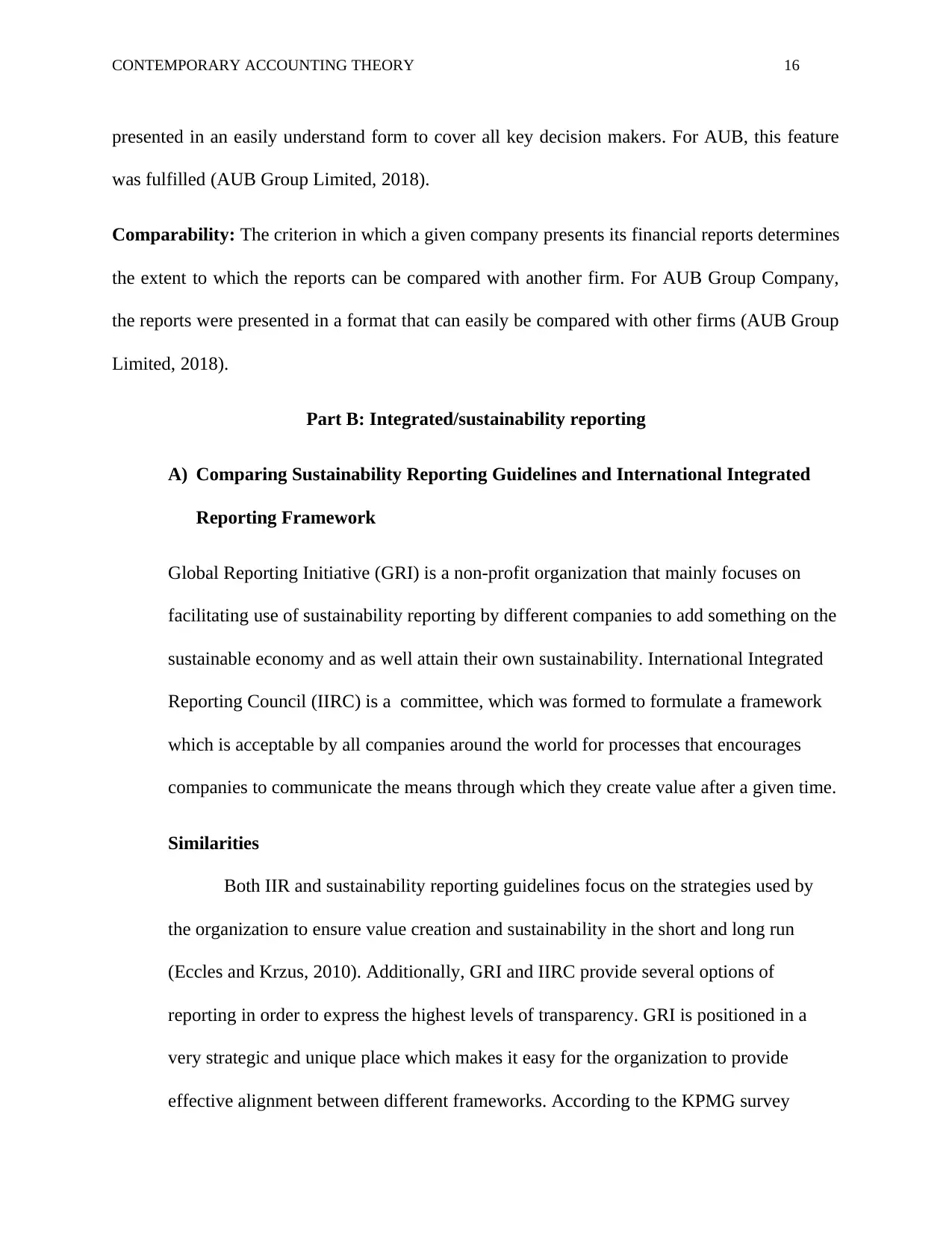
CONTEMPORARY ACCOUNTING THEORY 16
presented in an easily understand form to cover all key decision makers. For AUB, this feature
was fulfilled (AUB Group Limited, 2018).
Comparability: The criterion in which a given company presents its financial reports determines
the extent to which the reports can be compared with another firm. For AUB Group Company,
the reports were presented in a format that can easily be compared with other firms (AUB Group
Limited, 2018).
Part B: Integrated/sustainability reporting
A) Comparing Sustainability Reporting Guidelines and International Integrated
Reporting Framework
Global Reporting Initiative (GRI) is a non-profit organization that mainly focuses on
facilitating use of sustainability reporting by different companies to add something on the
sustainable economy and as well attain their own sustainability. International Integrated
Reporting Council (IIRC) is a committee, which was formed to formulate a framework
which is acceptable by all companies around the world for processes that encourages
companies to communicate the means through which they create value after a given time.
Similarities
Both IIR and sustainability reporting guidelines focus on the strategies used by
the organization to ensure value creation and sustainability in the short and long run
(Eccles and Krzus, 2010). Additionally, GRI and IIRC provide several options of
reporting in order to express the highest levels of transparency. GRI is positioned in a
very strategic and unique place which makes it easy for the organization to provide
effective alignment between different frameworks. According to the KPMG survey
presented in an easily understand form to cover all key decision makers. For AUB, this feature
was fulfilled (AUB Group Limited, 2018).
Comparability: The criterion in which a given company presents its financial reports determines
the extent to which the reports can be compared with another firm. For AUB Group Company,
the reports were presented in a format that can easily be compared with other firms (AUB Group
Limited, 2018).
Part B: Integrated/sustainability reporting
A) Comparing Sustainability Reporting Guidelines and International Integrated
Reporting Framework
Global Reporting Initiative (GRI) is a non-profit organization that mainly focuses on
facilitating use of sustainability reporting by different companies to add something on the
sustainable economy and as well attain their own sustainability. International Integrated
Reporting Council (IIRC) is a committee, which was formed to formulate a framework
which is acceptable by all companies around the world for processes that encourages
companies to communicate the means through which they create value after a given time.
Similarities
Both IIR and sustainability reporting guidelines focus on the strategies used by
the organization to ensure value creation and sustainability in the short and long run
(Eccles and Krzus, 2010). Additionally, GRI and IIRC provide several options of
reporting in order to express the highest levels of transparency. GRI is positioned in a
very strategic and unique place which makes it easy for the organization to provide
effective alignment between different frameworks. According to the KPMG survey
Secure Best Marks with AI Grader
Need help grading? Try our AI Grader for instant feedback on your assignments.
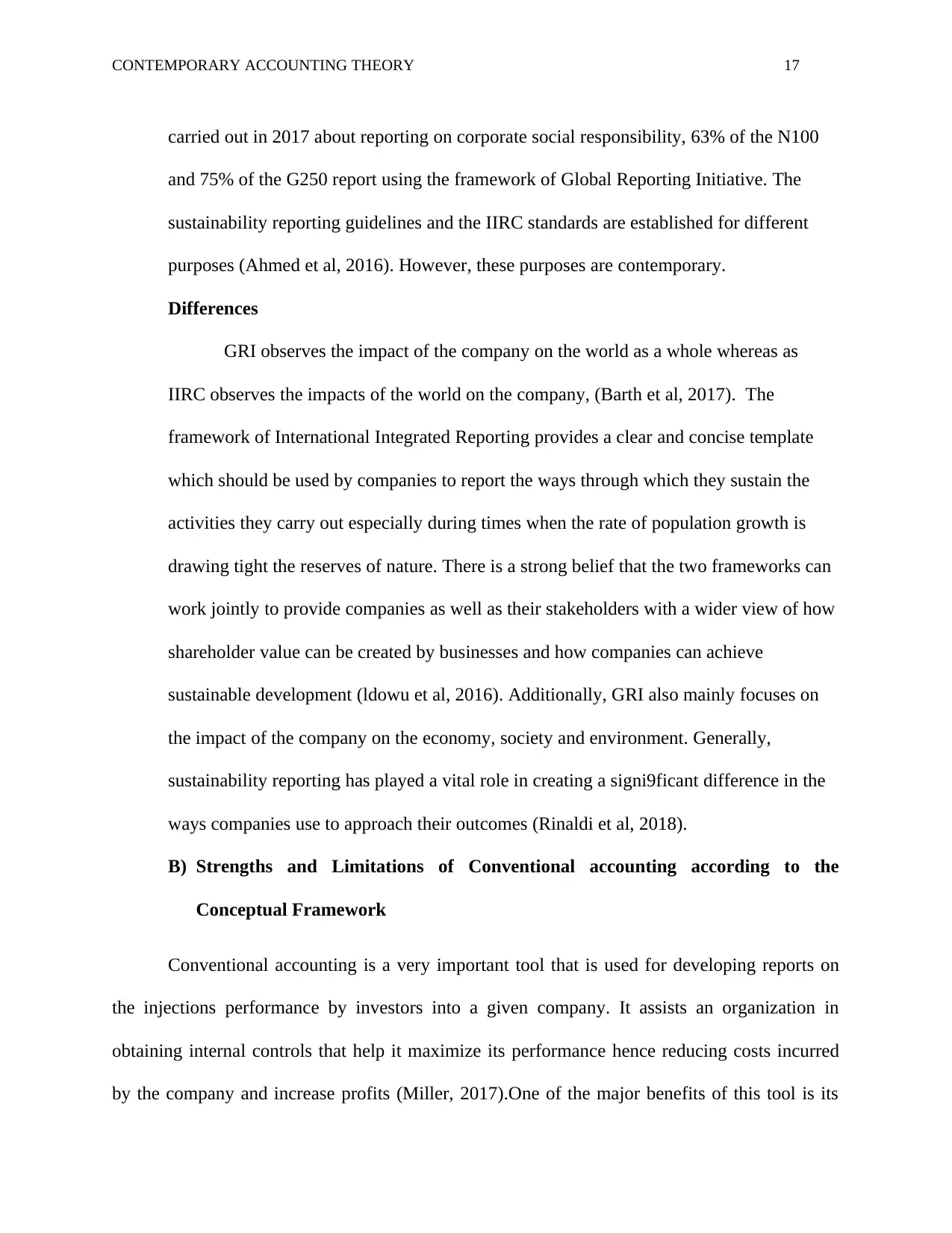
CONTEMPORARY ACCOUNTING THEORY 17
carried out in 2017 about reporting on corporate social responsibility, 63% of the N100
and 75% of the G250 report using the framework of Global Reporting Initiative. The
sustainability reporting guidelines and the IIRC standards are established for different
purposes (Ahmed et al, 2016). However, these purposes are contemporary.
Differences
GRI observes the impact of the company on the world as a whole whereas as
IIRC observes the impacts of the world on the company, (Barth et al, 2017). The
framework of International Integrated Reporting provides a clear and concise template
which should be used by companies to report the ways through which they sustain the
activities they carry out especially during times when the rate of population growth is
drawing tight the reserves of nature. There is a strong belief that the two frameworks can
work jointly to provide companies as well as their stakeholders with a wider view of how
shareholder value can be created by businesses and how companies can achieve
sustainable development (ldowu et al, 2016). Additionally, GRI also mainly focuses on
the impact of the company on the economy, society and environment. Generally,
sustainability reporting has played a vital role in creating a signi9ficant difference in the
ways companies use to approach their outcomes (Rinaldi et al, 2018).
B) Strengths and Limitations of Conventional accounting according to the
Conceptual Framework
Conventional accounting is a very important tool that is used for developing reports on
the injections performance by investors into a given company. It assists an organization in
obtaining internal controls that help it maximize its performance hence reducing costs incurred
by the company and increase profits (Miller, 2017).One of the major benefits of this tool is its
carried out in 2017 about reporting on corporate social responsibility, 63% of the N100
and 75% of the G250 report using the framework of Global Reporting Initiative. The
sustainability reporting guidelines and the IIRC standards are established for different
purposes (Ahmed et al, 2016). However, these purposes are contemporary.
Differences
GRI observes the impact of the company on the world as a whole whereas as
IIRC observes the impacts of the world on the company, (Barth et al, 2017). The
framework of International Integrated Reporting provides a clear and concise template
which should be used by companies to report the ways through which they sustain the
activities they carry out especially during times when the rate of population growth is
drawing tight the reserves of nature. There is a strong belief that the two frameworks can
work jointly to provide companies as well as their stakeholders with a wider view of how
shareholder value can be created by businesses and how companies can achieve
sustainable development (ldowu et al, 2016). Additionally, GRI also mainly focuses on
the impact of the company on the economy, society and environment. Generally,
sustainability reporting has played a vital role in creating a signi9ficant difference in the
ways companies use to approach their outcomes (Rinaldi et al, 2018).
B) Strengths and Limitations of Conventional accounting according to the
Conceptual Framework
Conventional accounting is a very important tool that is used for developing reports on
the injections performance by investors into a given company. It assists an organization in
obtaining internal controls that help it maximize its performance hence reducing costs incurred
by the company and increase profits (Miller, 2017).One of the major benefits of this tool is its
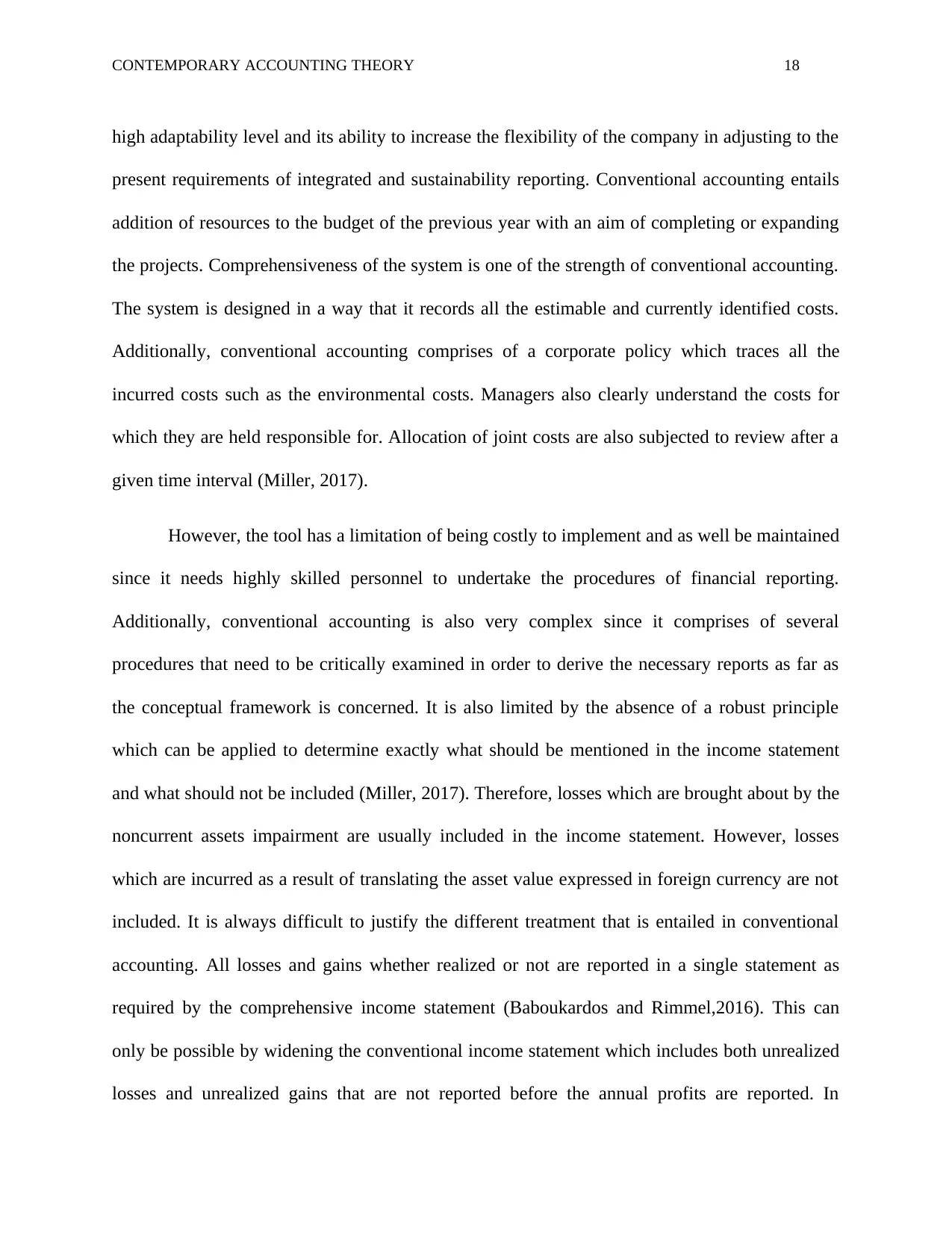
CONTEMPORARY ACCOUNTING THEORY 18
high adaptability level and its ability to increase the flexibility of the company in adjusting to the
present requirements of integrated and sustainability reporting. Conventional accounting entails
addition of resources to the budget of the previous year with an aim of completing or expanding
the projects. Comprehensiveness of the system is one of the strength of conventional accounting.
The system is designed in a way that it records all the estimable and currently identified costs.
Additionally, conventional accounting comprises of a corporate policy which traces all the
incurred costs such as the environmental costs. Managers also clearly understand the costs for
which they are held responsible for. Allocation of joint costs are also subjected to review after a
given time interval (Miller, 2017).
However, the tool has a limitation of being costly to implement and as well be maintained
since it needs highly skilled personnel to undertake the procedures of financial reporting.
Additionally, conventional accounting is also very complex since it comprises of several
procedures that need to be critically examined in order to derive the necessary reports as far as
the conceptual framework is concerned. It is also limited by the absence of a robust principle
which can be applied to determine exactly what should be mentioned in the income statement
and what should not be included (Miller, 2017). Therefore, losses which are brought about by the
noncurrent assets impairment are usually included in the income statement. However, losses
which are incurred as a result of translating the asset value expressed in foreign currency are not
included. It is always difficult to justify the different treatment that is entailed in conventional
accounting. All losses and gains whether realized or not are reported in a single statement as
required by the comprehensive income statement (Baboukardos and Rimmel,2016). This can
only be possible by widening the conventional income statement which includes both unrealized
losses and unrealized gains that are not reported before the annual profits are reported. In
high adaptability level and its ability to increase the flexibility of the company in adjusting to the
present requirements of integrated and sustainability reporting. Conventional accounting entails
addition of resources to the budget of the previous year with an aim of completing or expanding
the projects. Comprehensiveness of the system is one of the strength of conventional accounting.
The system is designed in a way that it records all the estimable and currently identified costs.
Additionally, conventional accounting comprises of a corporate policy which traces all the
incurred costs such as the environmental costs. Managers also clearly understand the costs for
which they are held responsible for. Allocation of joint costs are also subjected to review after a
given time interval (Miller, 2017).
However, the tool has a limitation of being costly to implement and as well be maintained
since it needs highly skilled personnel to undertake the procedures of financial reporting.
Additionally, conventional accounting is also very complex since it comprises of several
procedures that need to be critically examined in order to derive the necessary reports as far as
the conceptual framework is concerned. It is also limited by the absence of a robust principle
which can be applied to determine exactly what should be mentioned in the income statement
and what should not be included (Miller, 2017). Therefore, losses which are brought about by the
noncurrent assets impairment are usually included in the income statement. However, losses
which are incurred as a result of translating the asset value expressed in foreign currency are not
included. It is always difficult to justify the different treatment that is entailed in conventional
accounting. All losses and gains whether realized or not are reported in a single statement as
required by the comprehensive income statement (Baboukardos and Rimmel,2016). This can
only be possible by widening the conventional income statement which includes both unrealized
losses and unrealized gains that are not reported before the annual profits are reported. In
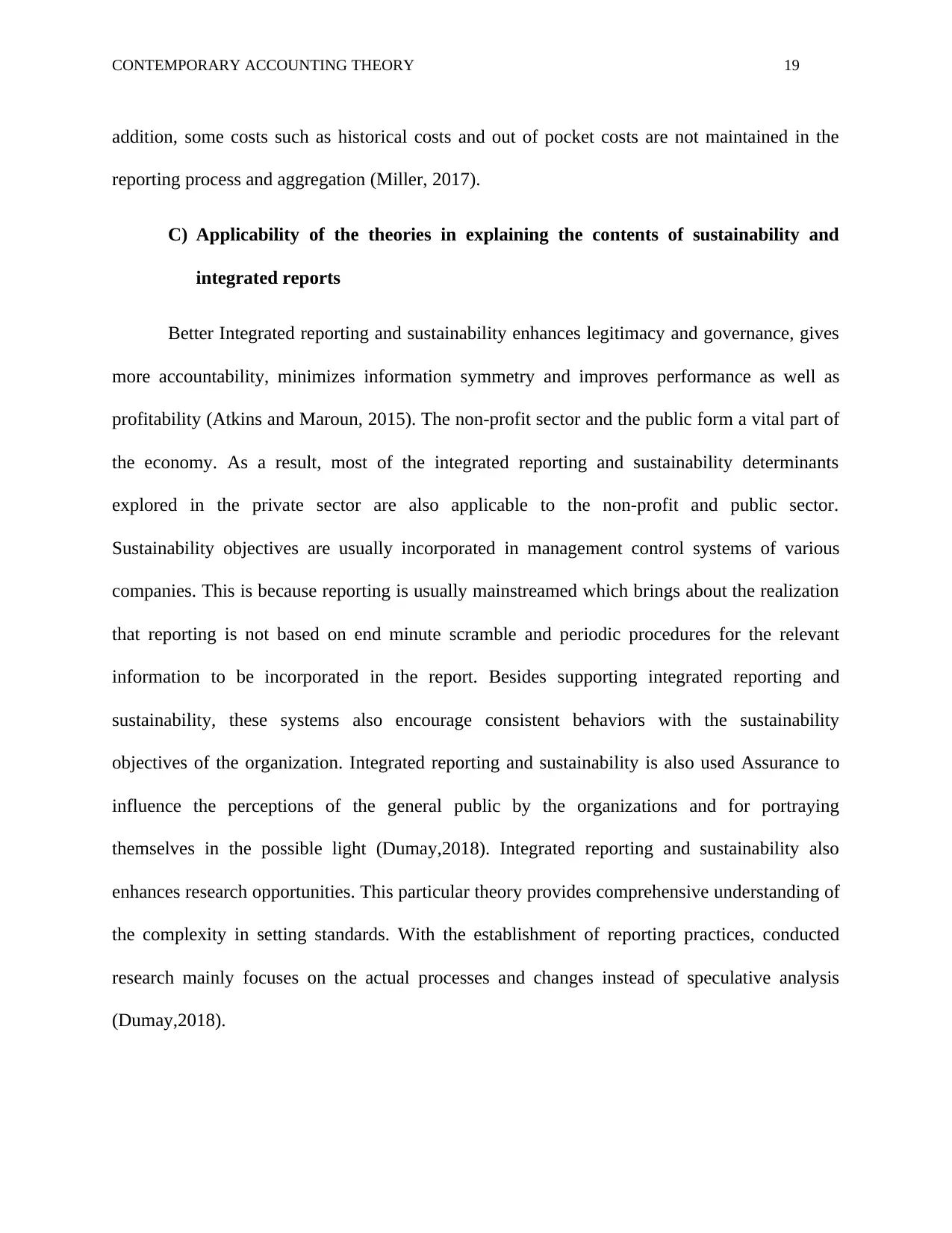
CONTEMPORARY ACCOUNTING THEORY 19
addition, some costs such as historical costs and out of pocket costs are not maintained in the
reporting process and aggregation (Miller, 2017).
C) Applicability of the theories in explaining the contents of sustainability and
integrated reports
Better Integrated reporting and sustainability enhances legitimacy and governance, gives
more accountability, minimizes information symmetry and improves performance as well as
profitability (Atkins and Maroun, 2015). The non-profit sector and the public form a vital part of
the economy. As a result, most of the integrated reporting and sustainability determinants
explored in the private sector are also applicable to the non-profit and public sector.
Sustainability objectives are usually incorporated in management control systems of various
companies. This is because reporting is usually mainstreamed which brings about the realization
that reporting is not based on end minute scramble and periodic procedures for the relevant
information to be incorporated in the report. Besides supporting integrated reporting and
sustainability, these systems also encourage consistent behaviors with the sustainability
objectives of the organization. Integrated reporting and sustainability is also used Assurance to
influence the perceptions of the general public by the organizations and for portraying
themselves in the possible light (Dumay,2018). Integrated reporting and sustainability also
enhances research opportunities. This particular theory provides comprehensive understanding of
the complexity in setting standards. With the establishment of reporting practices, conducted
research mainly focuses on the actual processes and changes instead of speculative analysis
(Dumay,2018).
addition, some costs such as historical costs and out of pocket costs are not maintained in the
reporting process and aggregation (Miller, 2017).
C) Applicability of the theories in explaining the contents of sustainability and
integrated reports
Better Integrated reporting and sustainability enhances legitimacy and governance, gives
more accountability, minimizes information symmetry and improves performance as well as
profitability (Atkins and Maroun, 2015). The non-profit sector and the public form a vital part of
the economy. As a result, most of the integrated reporting and sustainability determinants
explored in the private sector are also applicable to the non-profit and public sector.
Sustainability objectives are usually incorporated in management control systems of various
companies. This is because reporting is usually mainstreamed which brings about the realization
that reporting is not based on end minute scramble and periodic procedures for the relevant
information to be incorporated in the report. Besides supporting integrated reporting and
sustainability, these systems also encourage consistent behaviors with the sustainability
objectives of the organization. Integrated reporting and sustainability is also used Assurance to
influence the perceptions of the general public by the organizations and for portraying
themselves in the possible light (Dumay,2018). Integrated reporting and sustainability also
enhances research opportunities. This particular theory provides comprehensive understanding of
the complexity in setting standards. With the establishment of reporting practices, conducted
research mainly focuses on the actual processes and changes instead of speculative analysis
(Dumay,2018).
Paraphrase This Document
Need a fresh take? Get an instant paraphrase of this document with our AI Paraphraser
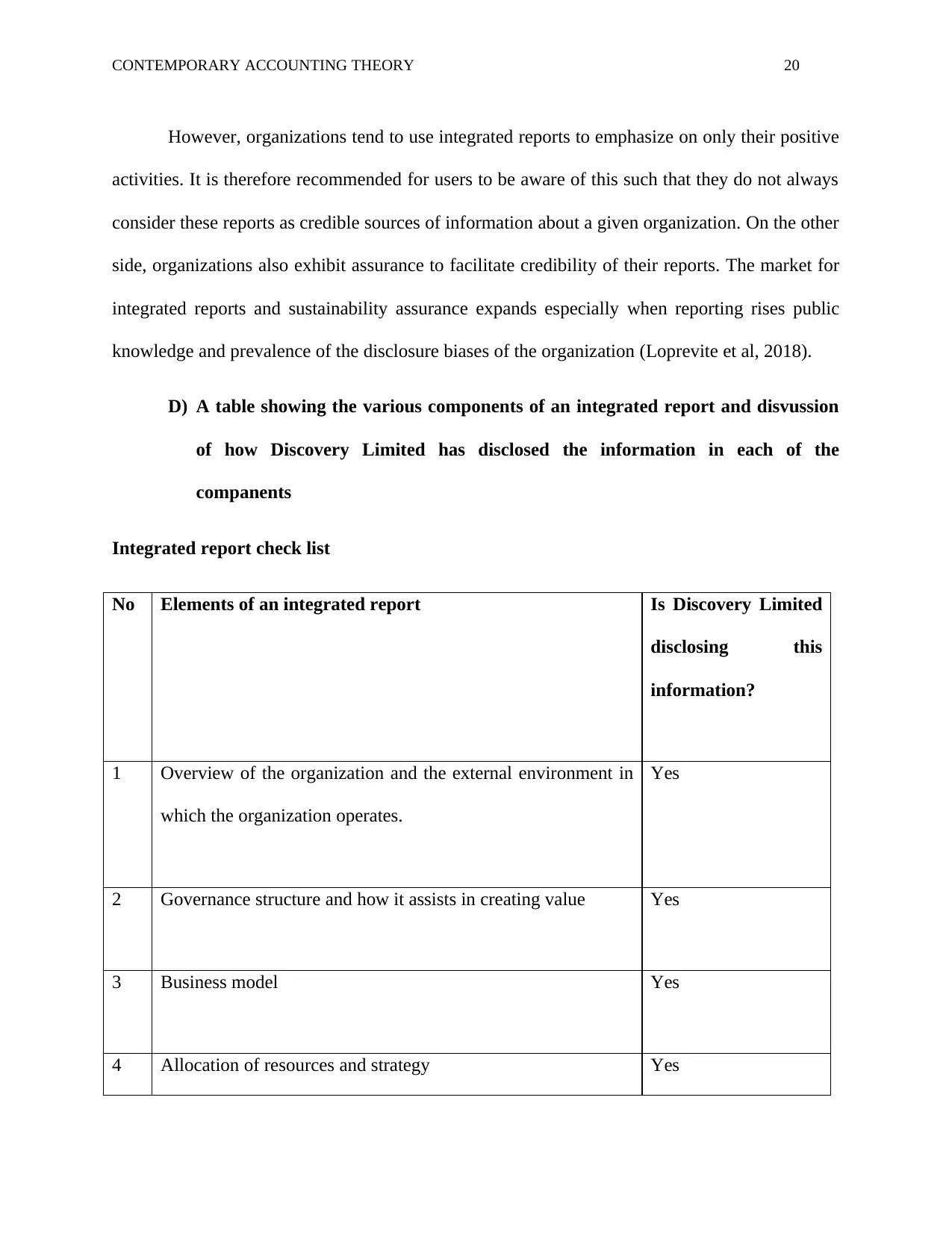
CONTEMPORARY ACCOUNTING THEORY 20
However, organizations tend to use integrated reports to emphasize on only their positive
activities. It is therefore recommended for users to be aware of this such that they do not always
consider these reports as credible sources of information about a given organization. On the other
side, organizations also exhibit assurance to facilitate credibility of their reports. The market for
integrated reports and sustainability assurance expands especially when reporting rises public
knowledge and prevalence of the disclosure biases of the organization (Loprevite et al, 2018).
D) A table showing the various components of an integrated report and disvussion
of how Discovery Limited has disclosed the information in each of the
companents
Integrated report check list
No Elements of an integrated report Is Discovery Limited
disclosing this
information?
1 Overview of the organization and the external environment in
which the organization operates.
Yes
2 Governance structure and how it assists in creating value Yes
3 Business model Yes
4 Allocation of resources and strategy Yes
However, organizations tend to use integrated reports to emphasize on only their positive
activities. It is therefore recommended for users to be aware of this such that they do not always
consider these reports as credible sources of information about a given organization. On the other
side, organizations also exhibit assurance to facilitate credibility of their reports. The market for
integrated reports and sustainability assurance expands especially when reporting rises public
knowledge and prevalence of the disclosure biases of the organization (Loprevite et al, 2018).
D) A table showing the various components of an integrated report and disvussion
of how Discovery Limited has disclosed the information in each of the
companents
Integrated report check list
No Elements of an integrated report Is Discovery Limited
disclosing this
information?
1 Overview of the organization and the external environment in
which the organization operates.
Yes
2 Governance structure and how it assists in creating value Yes
3 Business model Yes
4 Allocation of resources and strategy Yes
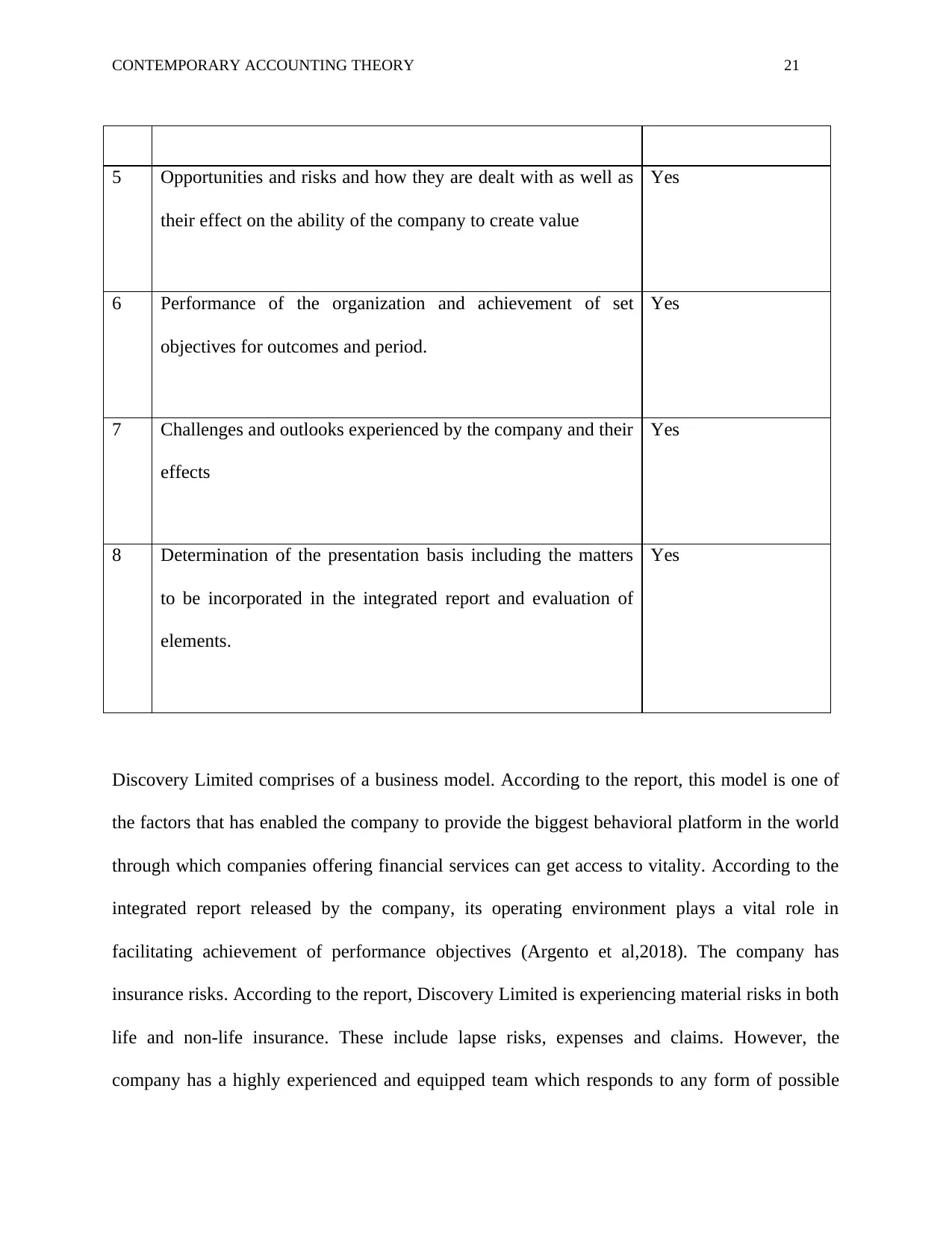
CONTEMPORARY ACCOUNTING THEORY 21
5 Opportunities and risks and how they are dealt with as well as
their effect on the ability of the company to create value
Yes
6 Performance of the organization and achievement of set
objectives for outcomes and period.
Yes
7 Challenges and outlooks experienced by the company and their
effects
Yes
8 Determination of the presentation basis including the matters
to be incorporated in the integrated report and evaluation of
elements.
Yes
Discovery Limited comprises of a business model. According to the report, this model is one of
the factors that has enabled the company to provide the biggest behavioral platform in the world
through which companies offering financial services can get access to vitality. According to the
integrated report released by the company, its operating environment plays a vital role in
facilitating achievement of performance objectives (Argento et al,2018). The company has
insurance risks. According to the report, Discovery Limited is experiencing material risks in both
life and non-life insurance. These include lapse risks, expenses and claims. However, the
company has a highly experienced and equipped team which responds to any form of possible
5 Opportunities and risks and how they are dealt with as well as
their effect on the ability of the company to create value
Yes
6 Performance of the organization and achievement of set
objectives for outcomes and period.
Yes
7 Challenges and outlooks experienced by the company and their
effects
Yes
8 Determination of the presentation basis including the matters
to be incorporated in the integrated report and evaluation of
elements.
Yes
Discovery Limited comprises of a business model. According to the report, this model is one of
the factors that has enabled the company to provide the biggest behavioral platform in the world
through which companies offering financial services can get access to vitality. According to the
integrated report released by the company, its operating environment plays a vital role in
facilitating achievement of performance objectives (Argento et al,2018). The company has
insurance risks. According to the report, Discovery Limited is experiencing material risks in both
life and non-life insurance. These include lapse risks, expenses and claims. However, the
company has a highly experienced and equipped team which responds to any form of possible
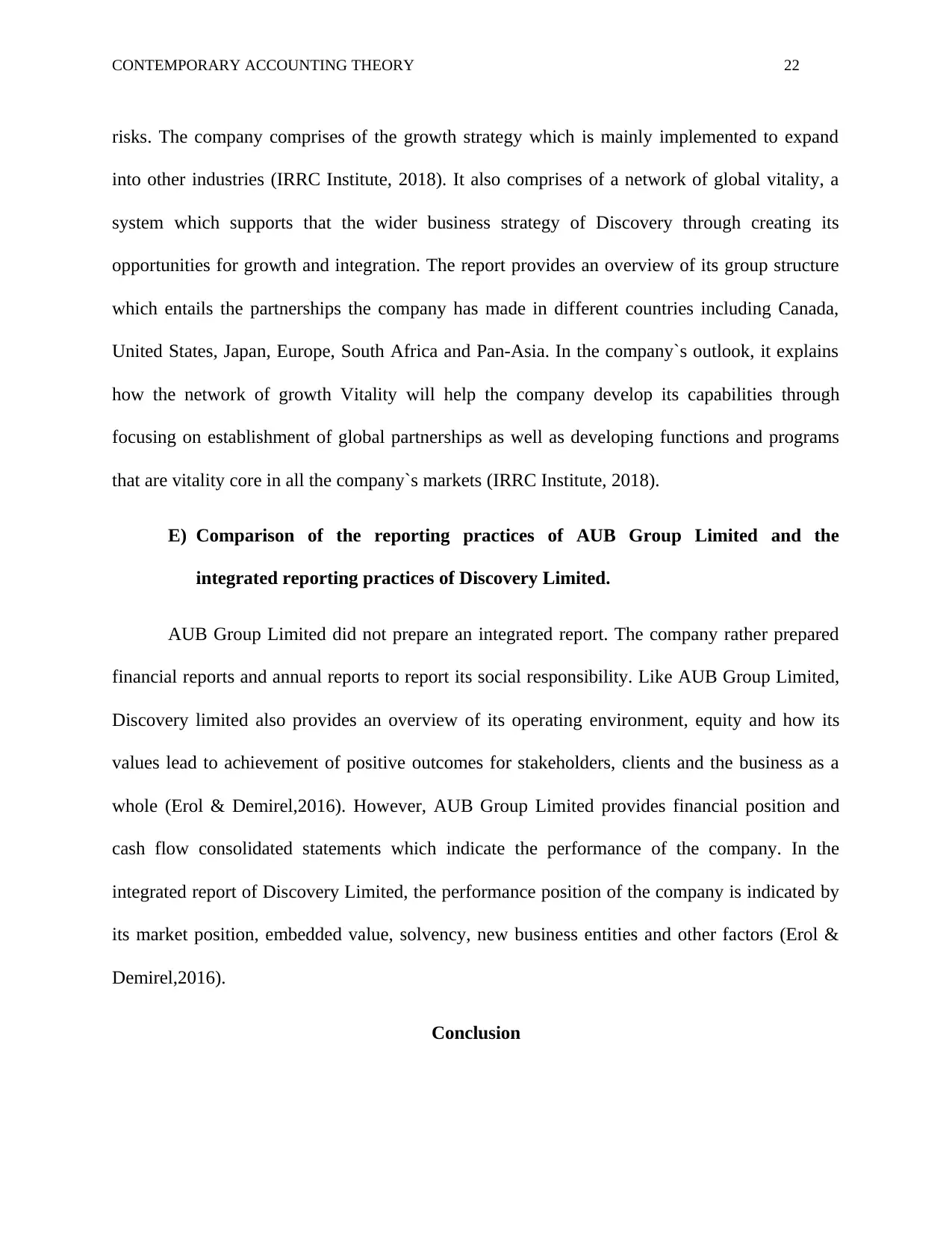
CONTEMPORARY ACCOUNTING THEORY 22
risks. The company comprises of the growth strategy which is mainly implemented to expand
into other industries (IRRC Institute, 2018). It also comprises of a network of global vitality, a
system which supports that the wider business strategy of Discovery through creating its
opportunities for growth and integration. The report provides an overview of its group structure
which entails the partnerships the company has made in different countries including Canada,
United States, Japan, Europe, South Africa and Pan-Asia. In the company`s outlook, it explains
how the network of growth Vitality will help the company develop its capabilities through
focusing on establishment of global partnerships as well as developing functions and programs
that are vitality core in all the company`s markets (IRRC Institute, 2018).
E) Comparison of the reporting practices of AUB Group Limited and the
integrated reporting practices of Discovery Limited.
AUB Group Limited did not prepare an integrated report. The company rather prepared
financial reports and annual reports to report its social responsibility. Like AUB Group Limited,
Discovery limited also provides an overview of its operating environment, equity and how its
values lead to achievement of positive outcomes for stakeholders, clients and the business as a
whole (Erol & Demirel,2016). However, AUB Group Limited provides financial position and
cash flow consolidated statements which indicate the performance of the company. In the
integrated report of Discovery Limited, the performance position of the company is indicated by
its market position, embedded value, solvency, new business entities and other factors (Erol &
Demirel,2016).
Conclusion
risks. The company comprises of the growth strategy which is mainly implemented to expand
into other industries (IRRC Institute, 2018). It also comprises of a network of global vitality, a
system which supports that the wider business strategy of Discovery through creating its
opportunities for growth and integration. The report provides an overview of its group structure
which entails the partnerships the company has made in different countries including Canada,
United States, Japan, Europe, South Africa and Pan-Asia. In the company`s outlook, it explains
how the network of growth Vitality will help the company develop its capabilities through
focusing on establishment of global partnerships as well as developing functions and programs
that are vitality core in all the company`s markets (IRRC Institute, 2018).
E) Comparison of the reporting practices of AUB Group Limited and the
integrated reporting practices of Discovery Limited.
AUB Group Limited did not prepare an integrated report. The company rather prepared
financial reports and annual reports to report its social responsibility. Like AUB Group Limited,
Discovery limited also provides an overview of its operating environment, equity and how its
values lead to achievement of positive outcomes for stakeholders, clients and the business as a
whole (Erol & Demirel,2016). However, AUB Group Limited provides financial position and
cash flow consolidated statements which indicate the performance of the company. In the
integrated report of Discovery Limited, the performance position of the company is indicated by
its market position, embedded value, solvency, new business entities and other factors (Erol &
Demirel,2016).
Conclusion
Secure Best Marks with AI Grader
Need help grading? Try our AI Grader for instant feedback on your assignments.
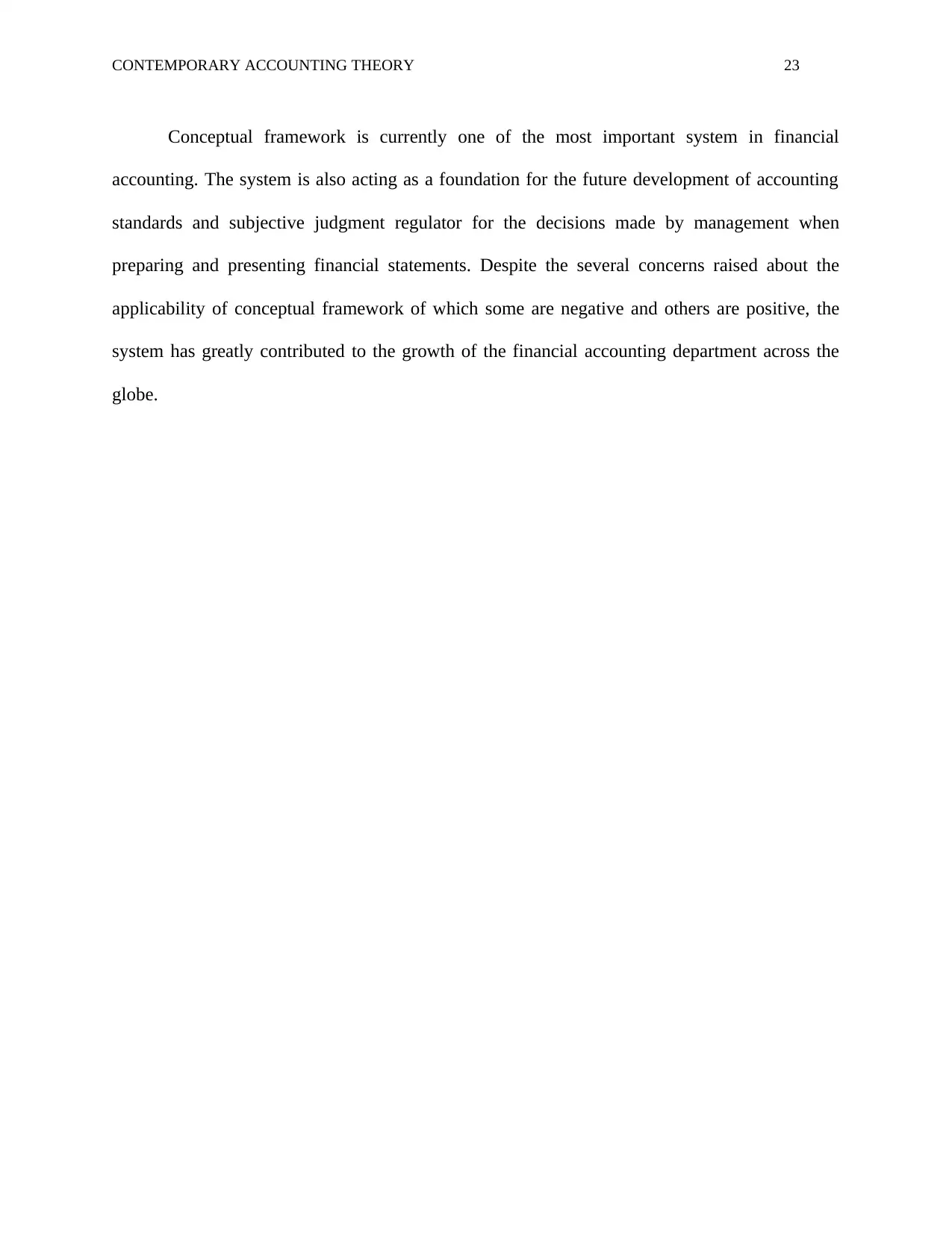
CONTEMPORARY ACCOUNTING THEORY 23
Conceptual framework is currently one of the most important system in financial
accounting. The system is also acting as a foundation for the future development of accounting
standards and subjective judgment regulator for the decisions made by management when
preparing and presenting financial statements. Despite the several concerns raised about the
applicability of conceptual framework of which some are negative and others are positive, the
system has greatly contributed to the growth of the financial accounting department across the
globe.
Conceptual framework is currently one of the most important system in financial
accounting. The system is also acting as a foundation for the future development of accounting
standards and subjective judgment regulator for the decisions made by management when
preparing and presenting financial statements. Despite the several concerns raised about the
applicability of conceptual framework of which some are negative and others are positive, the
system has greatly contributed to the growth of the financial accounting department across the
globe.
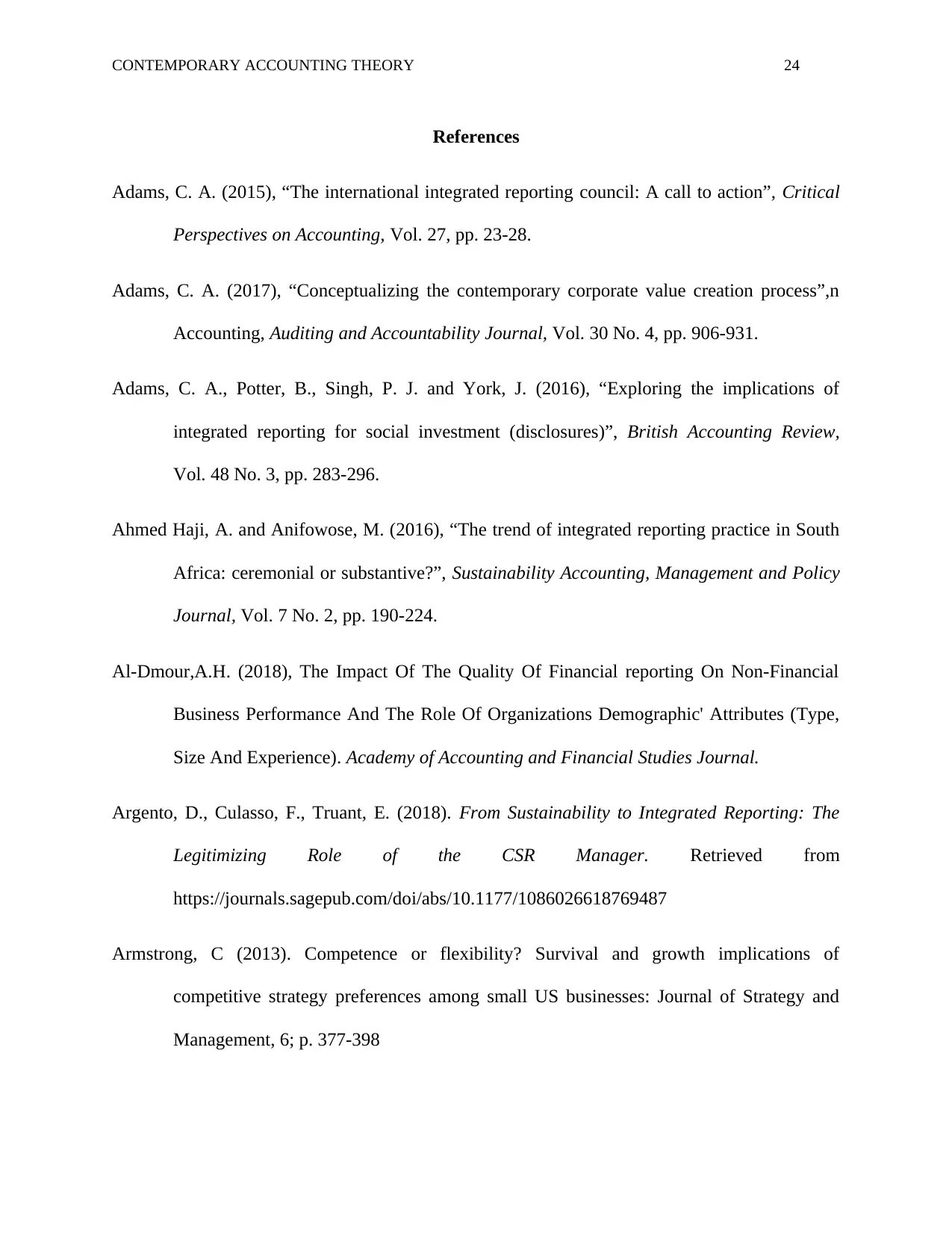
CONTEMPORARY ACCOUNTING THEORY 24
References
Adams, C. A. (2015), “The international integrated reporting council: A call to action”, Critical
Perspectives on Accounting, Vol. 27, pp. 23-28.
Adams, C. A. (2017), “Conceptualizing the contemporary corporate value creation process”,n
Accounting, Auditing and Accountability Journal, Vol. 30 No. 4, pp. 906-931.
Adams, C. A., Potter, B., Singh, P. J. and York, J. (2016), “Exploring the implications of
integrated reporting for social investment (disclosures)”, British Accounting Review,
Vol. 48 No. 3, pp. 283-296.
Ahmed Haji, A. and Anifowose, M. (2016), “The trend of integrated reporting practice in South
Africa: ceremonial or substantive?”, Sustainability Accounting, Management and Policy
Journal, Vol. 7 No. 2, pp. 190-224.
Al-Dmour,A.H. (2018), The Impact Of The Quality Of Financial reporting On Non-Financial
Business Performance And The Role Of Organizations Demographic' Attributes (Type,
Size And Experience). Academy of Accounting and Financial Studies Journal.
Argento, D., Culasso, F., Truant, E. (2018). From Sustainability to Integrated Reporting: The
Legitimizing Role of the CSR Manager. Retrieved from
https://journals.sagepub.com/doi/abs/10.1177/1086026618769487
Armstrong, C (2013). Competence or flexibility? Survival and growth implications of
competitive strategy preferences among small US businesses: Journal of Strategy and
Management, 6; p. 377-398
References
Adams, C. A. (2015), “The international integrated reporting council: A call to action”, Critical
Perspectives on Accounting, Vol. 27, pp. 23-28.
Adams, C. A. (2017), “Conceptualizing the contemporary corporate value creation process”,n
Accounting, Auditing and Accountability Journal, Vol. 30 No. 4, pp. 906-931.
Adams, C. A., Potter, B., Singh, P. J. and York, J. (2016), “Exploring the implications of
integrated reporting for social investment (disclosures)”, British Accounting Review,
Vol. 48 No. 3, pp. 283-296.
Ahmed Haji, A. and Anifowose, M. (2016), “The trend of integrated reporting practice in South
Africa: ceremonial or substantive?”, Sustainability Accounting, Management and Policy
Journal, Vol. 7 No. 2, pp. 190-224.
Al-Dmour,A.H. (2018), The Impact Of The Quality Of Financial reporting On Non-Financial
Business Performance And The Role Of Organizations Demographic' Attributes (Type,
Size And Experience). Academy of Accounting and Financial Studies Journal.
Argento, D., Culasso, F., Truant, E. (2018). From Sustainability to Integrated Reporting: The
Legitimizing Role of the CSR Manager. Retrieved from
https://journals.sagepub.com/doi/abs/10.1177/1086026618769487
Armstrong, C (2013). Competence or flexibility? Survival and growth implications of
competitive strategy preferences among small US businesses: Journal of Strategy and
Management, 6; p. 377-398
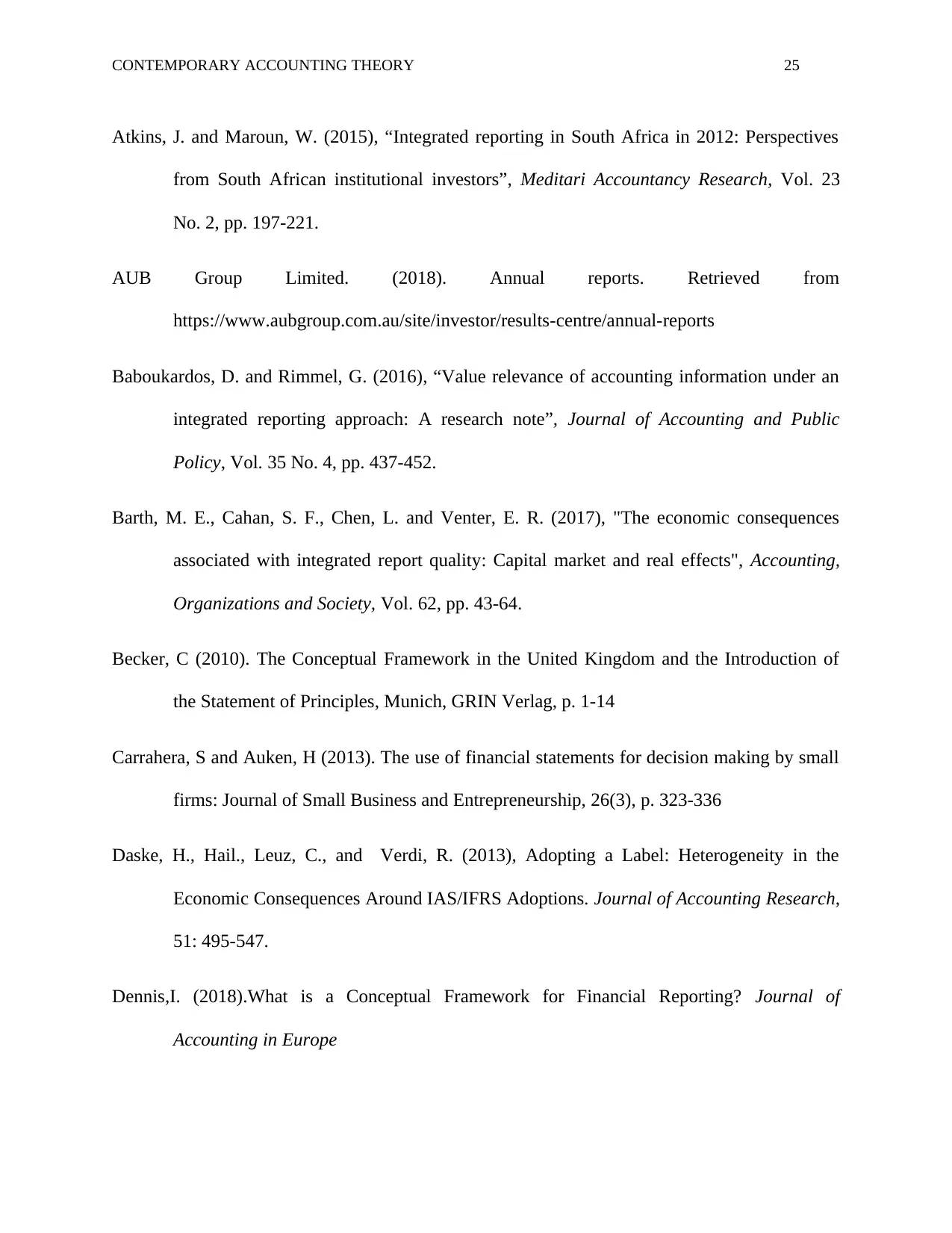
CONTEMPORARY ACCOUNTING THEORY 25
Atkins, J. and Maroun, W. (2015), “Integrated reporting in South Africa in 2012: Perspectives
from South African institutional investors”, Meditari Accountancy Research, Vol. 23
No. 2, pp. 197-221.
AUB Group Limited. (2018). Annual reports. Retrieved from
https://www.aubgroup.com.au/site/investor/results-centre/annual-reports
Baboukardos, D. and Rimmel, G. (2016), “Value relevance of accounting information under an
integrated reporting approach: A research note”, Journal of Accounting and Public
Policy, Vol. 35 No. 4, pp. 437-452.
Barth, M. E., Cahan, S. F., Chen, L. and Venter, E. R. (2017), "The economic consequences
associated with integrated report quality: Capital market and real effects", Accounting,
Organizations and Society, Vol. 62, pp. 43-64.
Becker, C (2010). The Conceptual Framework in the United Kingdom and the Introduction of
the Statement of Principles, Munich, GRIN Verlag, p. 1-14
Carrahera, S and Auken, H (2013). The use of financial statements for decision making by small
firms: Journal of Small Business and Entrepreneurship, 26(3), p. 323-336
Daske, H., Hail., Leuz, C., and Verdi, R. (2013), Adopting a Label: Heterogeneity in the
Economic Consequences Around IAS/IFRS Adoptions. Journal of Accounting Research,
51: 495-547.
Dennis,I. (2018).What is a Conceptual Framework for Financial Reporting? Journal of
Accounting in Europe
Atkins, J. and Maroun, W. (2015), “Integrated reporting in South Africa in 2012: Perspectives
from South African institutional investors”, Meditari Accountancy Research, Vol. 23
No. 2, pp. 197-221.
AUB Group Limited. (2018). Annual reports. Retrieved from
https://www.aubgroup.com.au/site/investor/results-centre/annual-reports
Baboukardos, D. and Rimmel, G. (2016), “Value relevance of accounting information under an
integrated reporting approach: A research note”, Journal of Accounting and Public
Policy, Vol. 35 No. 4, pp. 437-452.
Barth, M. E., Cahan, S. F., Chen, L. and Venter, E. R. (2017), "The economic consequences
associated with integrated report quality: Capital market and real effects", Accounting,
Organizations and Society, Vol. 62, pp. 43-64.
Becker, C (2010). The Conceptual Framework in the United Kingdom and the Introduction of
the Statement of Principles, Munich, GRIN Verlag, p. 1-14
Carrahera, S and Auken, H (2013). The use of financial statements for decision making by small
firms: Journal of Small Business and Entrepreneurship, 26(3), p. 323-336
Daske, H., Hail., Leuz, C., and Verdi, R. (2013), Adopting a Label: Heterogeneity in the
Economic Consequences Around IAS/IFRS Adoptions. Journal of Accounting Research,
51: 495-547.
Dennis,I. (2018).What is a Conceptual Framework for Financial Reporting? Journal of
Accounting in Europe
Paraphrase This Document
Need a fresh take? Get an instant paraphrase of this document with our AI Paraphraser
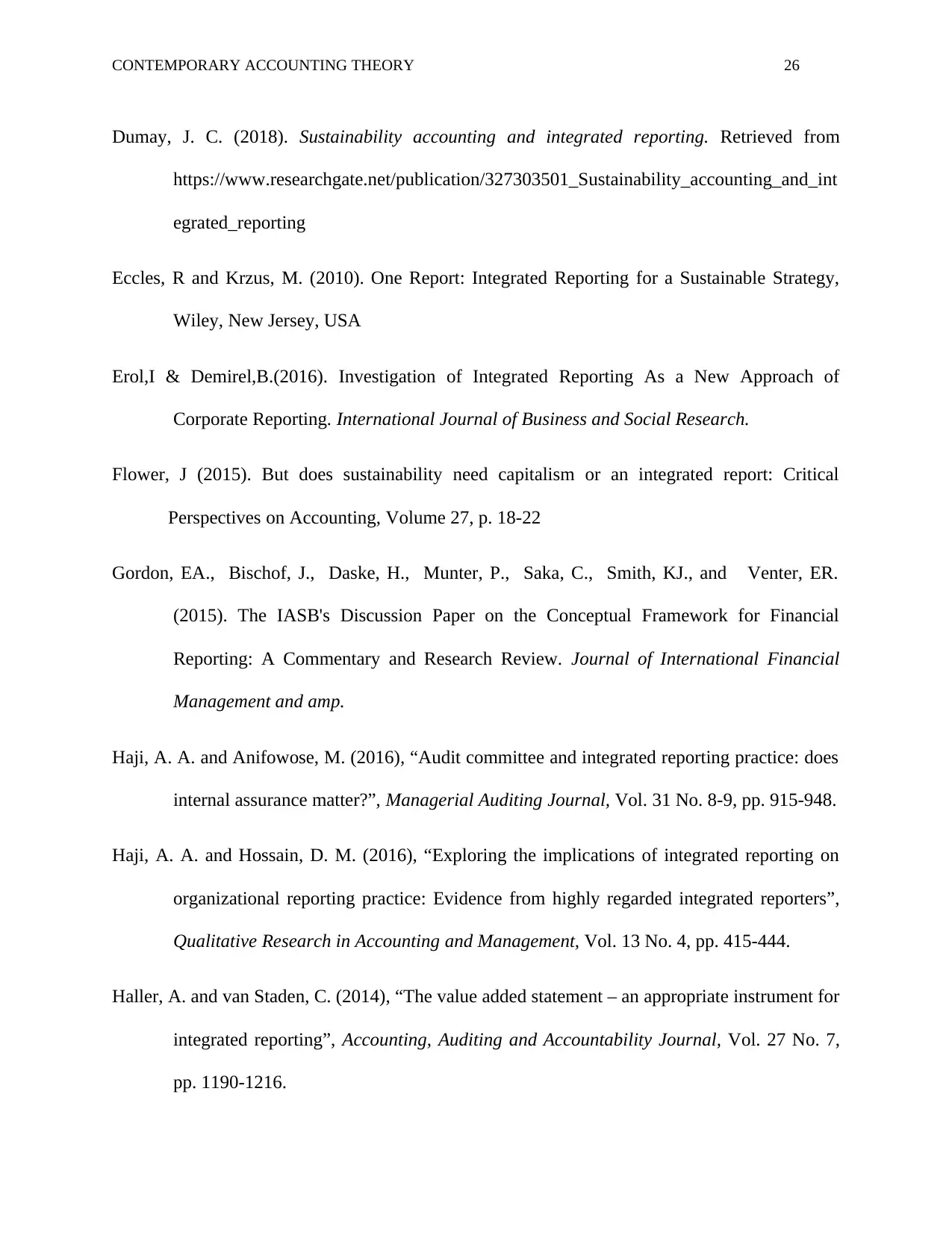
CONTEMPORARY ACCOUNTING THEORY 26
Dumay, J. C. (2018). Sustainability accounting and integrated reporting. Retrieved from
https://www.researchgate.net/publication/327303501_Sustainability_accounting_and_int
egrated_reporting
Eccles, R and Krzus, M. (2010). One Report: Integrated Reporting for a Sustainable Strategy,
Wiley, New Jersey, USA
Erol,I & Demirel,B.(2016). Investigation of Integrated Reporting As a New Approach of
Corporate Reporting. International Journal of Business and Social Research.
Flower, J (2015). But does sustainability need capitalism or an integrated report: Critical
Perspectives on Accounting, Volume 27, p. 18-22
Gordon, EA., Bischof, J., Daske, H., Munter, P., Saka, C., Smith, KJ., and Venter, ER.
(2015). The IASB's Discussion Paper on the Conceptual Framework for Financial
Reporting: A Commentary and Research Review. Journal of International Financial
Management and amp.
Haji, A. A. and Anifowose, M. (2016), “Audit committee and integrated reporting practice: does
internal assurance matter?”, Managerial Auditing Journal, Vol. 31 No. 8-9, pp. 915-948.
Haji, A. A. and Hossain, D. M. (2016), “Exploring the implications of integrated reporting on
organizational reporting practice: Evidence from highly regarded integrated reporters”,
Qualitative Research in Accounting and Management, Vol. 13 No. 4, pp. 415-444.
Haller, A. and van Staden, C. (2014), “The value added statement – an appropriate instrument for
integrated reporting”, Accounting, Auditing and Accountability Journal, Vol. 27 No. 7,
pp. 1190-1216.
Dumay, J. C. (2018). Sustainability accounting and integrated reporting. Retrieved from
https://www.researchgate.net/publication/327303501_Sustainability_accounting_and_int
egrated_reporting
Eccles, R and Krzus, M. (2010). One Report: Integrated Reporting for a Sustainable Strategy,
Wiley, New Jersey, USA
Erol,I & Demirel,B.(2016). Investigation of Integrated Reporting As a New Approach of
Corporate Reporting. International Journal of Business and Social Research.
Flower, J (2015). But does sustainability need capitalism or an integrated report: Critical
Perspectives on Accounting, Volume 27, p. 18-22
Gordon, EA., Bischof, J., Daske, H., Munter, P., Saka, C., Smith, KJ., and Venter, ER.
(2015). The IASB's Discussion Paper on the Conceptual Framework for Financial
Reporting: A Commentary and Research Review. Journal of International Financial
Management and amp.
Haji, A. A. and Anifowose, M. (2016), “Audit committee and integrated reporting practice: does
internal assurance matter?”, Managerial Auditing Journal, Vol. 31 No. 8-9, pp. 915-948.
Haji, A. A. and Hossain, D. M. (2016), “Exploring the implications of integrated reporting on
organizational reporting practice: Evidence from highly regarded integrated reporters”,
Qualitative Research in Accounting and Management, Vol. 13 No. 4, pp. 415-444.
Haller, A. and van Staden, C. (2014), “The value added statement – an appropriate instrument for
integrated reporting”, Accounting, Auditing and Accountability Journal, Vol. 27 No. 7,
pp. 1190-1216.
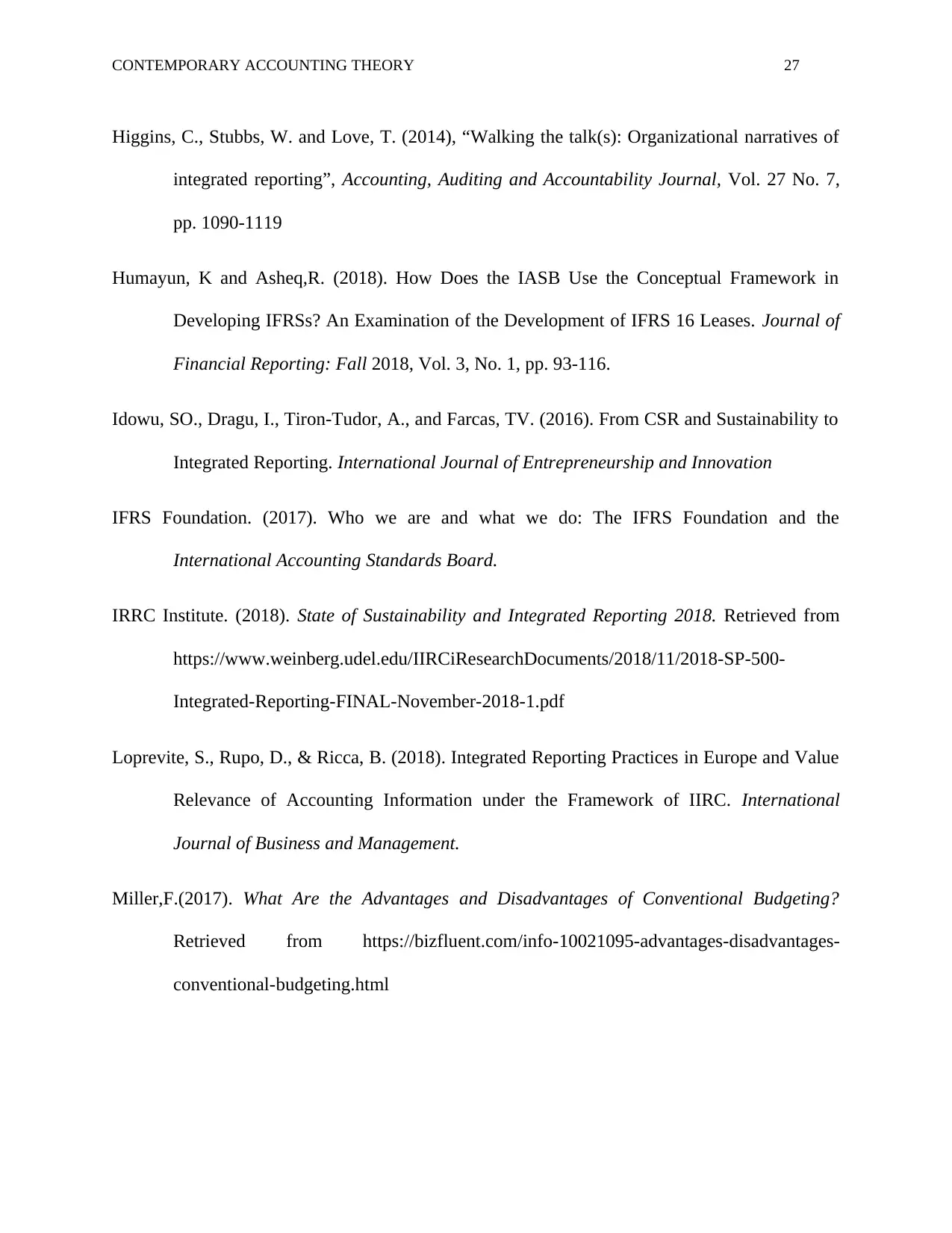
CONTEMPORARY ACCOUNTING THEORY 27
Higgins, C., Stubbs, W. and Love, T. (2014), “Walking the talk(s): Organizational narratives of
integrated reporting”, Accounting, Auditing and Accountability Journal, Vol. 27 No. 7,
pp. 1090-1119
Humayun, K and Asheq,R. (2018). How Does the IASB Use the Conceptual Framework in
Developing IFRSs? An Examination of the Development of IFRS 16 Leases. Journal of
Financial Reporting: Fall 2018, Vol. 3, No. 1, pp. 93-116.
Idowu, SO., Dragu, I., Tiron-Tudor, A., and Farcas, TV. (2016). From CSR and Sustainability to
Integrated Reporting. International Journal of Entrepreneurship and Innovation
IFRS Foundation. (2017). Who we are and what we do: The IFRS Foundation and the
International Accounting Standards Board.
IRRC Institute. (2018). State of Sustainability and Integrated Reporting 2018. Retrieved from
https://www.weinberg.udel.edu/IIRCiResearchDocuments/2018/11/2018-SP-500-
Integrated-Reporting-FINAL-November-2018-1.pdf
Loprevite, S., Rupo, D., & Ricca, B. (2018). Integrated Reporting Practices in Europe and Value
Relevance of Accounting Information under the Framework of IIRC. International
Journal of Business and Management.
Miller,F.(2017). What Are the Advantages and Disadvantages of Conventional Budgeting?
Retrieved from https://bizfluent.com/info-10021095-advantages-disadvantages-
conventional-budgeting.html
Higgins, C., Stubbs, W. and Love, T. (2014), “Walking the talk(s): Organizational narratives of
integrated reporting”, Accounting, Auditing and Accountability Journal, Vol. 27 No. 7,
pp. 1090-1119
Humayun, K and Asheq,R. (2018). How Does the IASB Use the Conceptual Framework in
Developing IFRSs? An Examination of the Development of IFRS 16 Leases. Journal of
Financial Reporting: Fall 2018, Vol. 3, No. 1, pp. 93-116.
Idowu, SO., Dragu, I., Tiron-Tudor, A., and Farcas, TV. (2016). From CSR and Sustainability to
Integrated Reporting. International Journal of Entrepreneurship and Innovation
IFRS Foundation. (2017). Who we are and what we do: The IFRS Foundation and the
International Accounting Standards Board.
IRRC Institute. (2018). State of Sustainability and Integrated Reporting 2018. Retrieved from
https://www.weinberg.udel.edu/IIRCiResearchDocuments/2018/11/2018-SP-500-
Integrated-Reporting-FINAL-November-2018-1.pdf
Loprevite, S., Rupo, D., & Ricca, B. (2018). Integrated Reporting Practices in Europe and Value
Relevance of Accounting Information under the Framework of IIRC. International
Journal of Business and Management.
Miller,F.(2017). What Are the Advantages and Disadvantages of Conventional Budgeting?
Retrieved from https://bizfluent.com/info-10021095-advantages-disadvantages-
conventional-budgeting.html
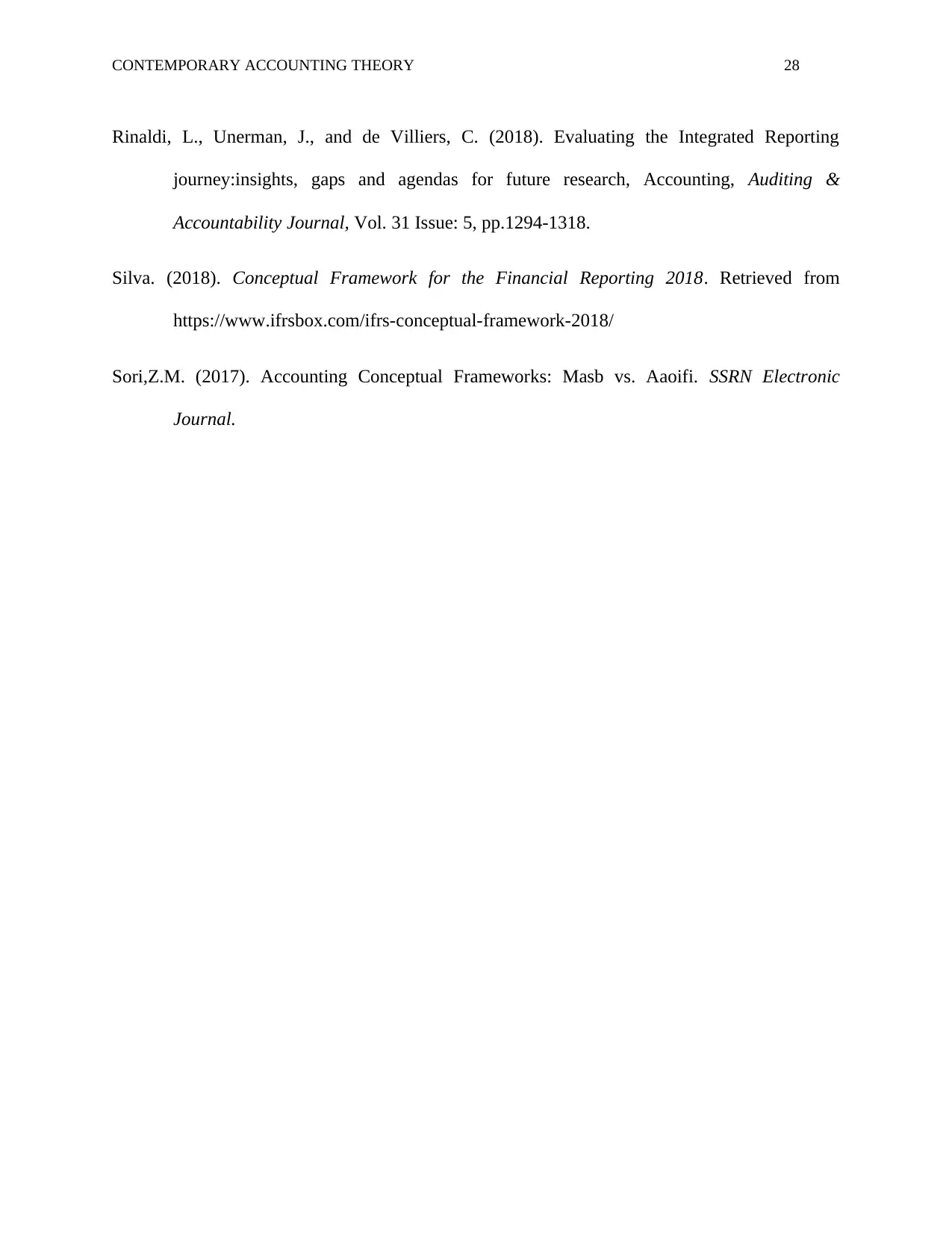
CONTEMPORARY ACCOUNTING THEORY 28
Rinaldi, L., Unerman, J., and de Villiers, C. (2018). Evaluating the Integrated Reporting
journey:insights, gaps and agendas for future research, Accounting, Auditing &
Accountability Journal, Vol. 31 Issue: 5, pp.1294-1318.
Silva. (2018). Conceptual Framework for the Financial Reporting 2018. Retrieved from
https://www.ifrsbox.com/ifrs-conceptual-framework-2018/
Sori,Z.M. (2017). Accounting Conceptual Frameworks: Masb vs. Aaoifi. SSRN Electronic
Journal.
Rinaldi, L., Unerman, J., and de Villiers, C. (2018). Evaluating the Integrated Reporting
journey:insights, gaps and agendas for future research, Accounting, Auditing &
Accountability Journal, Vol. 31 Issue: 5, pp.1294-1318.
Silva. (2018). Conceptual Framework for the Financial Reporting 2018. Retrieved from
https://www.ifrsbox.com/ifrs-conceptual-framework-2018/
Sori,Z.M. (2017). Accounting Conceptual Frameworks: Masb vs. Aaoifi. SSRN Electronic
Journal.
1 out of 28
Related Documents
Your All-in-One AI-Powered Toolkit for Academic Success.
+13062052269
info@desklib.com
Available 24*7 on WhatsApp / Email
![[object Object]](/_next/static/media/star-bottom.7253800d.svg)
Unlock your academic potential
© 2024 | Zucol Services PVT LTD | All rights reserved.





